#really bad character / theme analysis
Note
*sigh* thoughts on Nintendo's botw/totk timeline shenanigans and tomfoolery?
tbh. my maybe-unpopular opinion is that the timeline is only important when a game's place on the timeline seriously informs the way their narrative progresses. the problem is that before botw we almost NEVER got games where it didn't matter. it matters for skyward sword because it's the beginning, and it matters for tp/ww/alttp (and their respective sequels) because the choices the hero of time makes explicitly inform the narrative of those games in one way or another. it matters which timeline we're in for those games because these cycles we're seeing are close enough to oot's cycle that they're still feeling the effects of his choices. botw, however, takes place at minimum 10 thousand years after oot, so its place on the timeline actually functionally means nothing. botw is completely divorced from the hero of time & his story, so what he does is a nonissue in the context of botw link and zelda's story. thus, which timeline botw happens in is a nonissue. honestly I kind of liked the idea that it happened in all of them. i think there's a cool idea of inevitability that can be played with there. but the point is that the timeline exists to enhance and fill in the lore of games that need it, and botw/totk don't really need it because the devs finally realized they could make a game without the hero of time in it.
#i really do have a love-hate relationship with this timeline#because it's FASCINATING lore. genuinely. and i think it carries over the themes of certain games REALLY well#but i also think it's indicative of a trend in loz's writing that has REALLY annoyed me for a long time#which is this intense need to cling to oot#and on a certain level i get it. that was your most successful game probably ever. and it was an AMAZING game.#and i think there's definitely some corporate profit maximization tied up in this too--oot was an insane commercial success therefore you'r#not allowed to make new games we need you to just remake oot forever and ever#and that really annoys me because it makes certain games feel disjointed at best and barely-coherent at worst.#i think the best zelda games on the market are the ones where the devs were allowed to really push what they were working with#oot. majora. botw. hell i'd even put minish cap in there#these are games that don't quite follow what was the standard zelda gameplay at their time of release. they were experimental in some way#whether that be with graphics or puzzle mechanics or open-world or the gameplay premise in its entirety. there's something NEW there#and because the devs of those games were given that level of freedom the gameplay really enforces the narrative. everything feels complete#and designed to work together. as opposed to gameplay that feels disjointed or fights against story beats. you know??#so I think that the willingness to allow botw and totk to exist independently from the timeline is good at the very least from a developmen#standpoint because it implies a willingness to. stop making shitty oot remakes and let developers do something interesting.#and yes i do very much fear that the next 20 years of zelda will be shitty BOTW remakes now#in which botw link appears and undergoes the most insane character assassination youve ever seen in your life#but im trying to be optimistic here. if botw/totk can exist outside the timeline then we may no longer be stuck in the remake death loop#and i'm taking eow as a good sign (so far) that we're out of the death loop!! because that game looks NOTHING like botw or oot.#fingers crossed!!#anyway sorry for the game dev rant but tldr timeline good except when it's bad#asks#zelda analysis
154 notes
·
View notes
Text
So we know that Wei Wuxian's treatment after his death was horrible. Even if nothing could impact him directly, there was still neverending slander, hatred, misinformation, theft...
But, for a while after he died, the sects did try to impact him directly – namely, frequently trying to resummon his soul. And today I'll explore the possible reasons for this, their likelihoods, and why I'm so, so thankful that Wei Wuxian's soul managed to resist the summons. Because, spoiler alert (or, you know. maybe not)... none of them are good.
(Long meta ahead)
In my opinion, there are four likely motivations for this: confinement, coercion, torment, and potentially destruction.
Out of all of these, confinement is probably the most likely motivation, at least for most sects (Jins and Jiangs excluded, though it was likely what the Jin sect said their motivations were – but I'll get to them later). This one is the most simple – we know spirit-trapping pouches exist, and we know the sects also placed 120 stone beasts on the Burial Mounds to prevent Wei Wuxian's soul from escaping. Therefore, this seems to be the most likely motivation – and fortunately for Wei Wuxian, probably also the best case scenario, though it still certainly isn't a good one.
For the second, coercion – this is where the Jin sect come in (more specifically Jin Guangshan with the help of Jin Guangyao). Due to their wealth and resources, they're likely the sect who played the largest role in the soul-summoning rituals. We know what they're willing to do to try to gain power – keeping Wen Ning under the pretence he was burned to death and trying to control him with the nails, and working with and helping Xue Yang torture people to help him refine his demonic cultivation, in order to have the Yin hufu fixed. Along with working with many other cultivators, alongside Xue Yang – Jin Guangshan really, really wanted that seal.
And so, Jin GuangShan sought after all those who imitated Wei WuXian in cultivating the ghostly path and gathered them under his rule. He spent a great amount of money and resources and these people, ordering them to study and analyze the structure of the Tiger Seal in secrecy so that they could replicate and restore it.
- Villainous Friends extra, EXR
(Note that working with these cultivators very likely happened after Wei Wuxian's soul had failed to be summoned, since this happens some time after Wei Wuxian's death, whereas the soul-summoning ceromonies presumably started happening very close to it.)
In the previous paragraph, he's also quoted as having 'lusted after' the Yin hufu, which we already knew but it's nice to have a direct quote as evidence.
Now, would Wei WuXian willingly work with the Jin sect in doing this? No. We know that, and, given Wei Wuxian's actions in his first life (refusing to hand over the Tally, not being afraid to stand up to the sects, etc), I’m pretty sure Jin Guangshan knows that, too:
He beat around the bush a couple of times, using all his skills, yet Wei WuXian didn’t give in no matter what, and it made him run into a bunch of obstacles.
- Villainous Friends extra, EXR
So this could actually make things go two ways. One, I'm wrong and that wasn't actually part of the Jin sect's motivations, since they know they wouldn't be able to control him (and in that case, had they managed to summon him, I could imagine them putting him in a spirit-trapping pouch and doing something similar to what Jin Guangyao did to Nie Mingjue's head. Which, also, not good). Two, it was a part of their motivations, and they hoped to find a way around that. After all, there are other guidao users out there now, and Wei Wuxian would now be a gui*. Also, cultivators can obviously harm ghosts – see the very existence of Night Hunts, and I'd include Xue Yang's talisman-caused destruction of A-Qing as well (while he isn't a traditional cultivator, talismans can be used by everyone).
Now, would either of these methods actually work? I'm inclined to think not really (and I expand on the former method in a note below). Would that stop Jin Guangshan/Jin Guangyao/the cultivators they employ from trying? Especially considering Jin Guangshan's lust for power?
I'm inclined to think no, too.
For the third, look no further than Jiang Cheng's reputation of capturing and torturing demonic cultivators after Wei Wuxian's death, due to thinking they could be him. And this does happen – Jin Ling knows and talks about it, and there's not real motivation for him to negatively lie about someone he loves. Also, when they come across each other at Dafan Mountain, we're told this in Jiang Cheng's inner voice:
A moment ago, Jiang Cheng was certain that this person was Wei WuXian, and all of the blood in his body started to boil. Yet, now, Zidian was clearly telling him that he wasn’t. Zidian definitely wouldn’t deceive him or make a mistake, so he quickly calmed himself and thought, this doesn’t mean anything. I should first find an excuse to take him back and use every possible method to get information out of him. It’s impossible for him to not confess anything or give himself away. I’ve done things like this in the past anyways.
- MDZS Chapter 10, EXR translation
This mainly shows that he's tortured people before, rather than that he's tortured people because he thinks they're Wei Wuxian, but this reason is confirmed by Jin Ling in Chapter 24. Of course, the reason is also mentioned in this chapter, and there are other moments in the chapter that illustrate my point better**, but they come from second-hand sources which I know are easier to deny. Do take note of Jiang Cheng's expression both times he comes across 'Mo Xuanyu' (after he suspects he's Wei Wuxian) in Book One***, though:
After a moment, the corners of Jiang Cheng’s lips pulled into a twisted smile. His left hand started to unconsciously stroke the ring [Zidian] again. He spoke softly, “… Well, well. So you’re back?”
- Chapter 10, EXR
Although his face had always been clouded, marked with arrogance and satire, it seemed as if every corner of it had come alive. It was difficult to determine whether it was vengeful wrath, fathomless hatred, or raving ecstasy.
- Chapter 23, EXR
This does seem to line up with what people say his attitude to Wei Wuxian is – there doesn't seem to be any happiness at seeing him again at all. The only time a word that could suggest that ('ecstasy') is used, it's accompanied by 'raving', and considering the context and the other possibilities of his expression, it's... probably not due to happiness at being reunited.
So, considering 1) this, 2) his contribution to the Siege specifically intended to kill Wei Wuxian, and 3) that at the time of frequent soul-summoning Jiang Yanli's death would be even closer for him, I feel pretty confident in saying that yes, this is likely a motivation for the Jiang sect in trying to re-summon Wei Wuxian's soul after his death. And, as mentioned earlier, cultivators can harm ghosts (and we know Zidian is able to remove souls posessing a body from that body, and that Jiang Cheng used Zidian on 'Mo Xuanyu' in Chapter 10. If it wasn't able to restrain/harm ghosts, or other methods weren't able to, why would he risk Wei Wuxian's soul escaping?).
And finally, option four: destruction. We're heading into much more speculative territory here, so don't consider this on par with the first three. But consider this:
We know there are some spells, like Xue Yang's talisman used on A-Qing and the body-offering ritual, that can ruin the returning soul’s reincarnation cycle by destroying it. Therefore, soul destruction is possible.
The 'main'/supposed reason for summoning Wei Wuxian's soul back is to stop the "cultivation world, or even all of mortal land" from being "faced with the most insane damnation and revenge, sinking into nothing but chaos and despair" when Wei Wuxian inevitably returns. While, as mentioned above, I severely doubt this is the motivation for certain sects – and to me is likely a rumour which the Jins (again, especially Jin Guangsha) fanned the flames of to justify summoning Wei Wuxian back for their own purposes**** – there are other sects which would take it more seriously.
Although likely disrespectful, people already thought it served Wei Wuxian right to die without his body intact by the time of the second siege – something believed to negatively affect your reincarnation in your next life*****. This is only the logical next step, and I'm pretty sure the vast majority of people would believe that, again, it would serve Wei Wuxian right, or would at least lead to less harm of the world in the long run.
For these reasons, I could definitely see this as an option for some sects, especially the sects who consider themselves more 'righteous' (cough cough the Nies under Nie Mingjue cough cough). After all, evil is evil and good is good, and the evil deserve what's coming to them. And what better way to prevent that than from preventing his soul from returning at all? So for the Nie sect – and likely some of the smaller sects involved in the Siege, since among them, additudes probably vary – yes, I do think it could be a motivation.
I’m not as sure about the Lans being willing to go this far, and that’s largely for two reasons. One, Lan Wangji’s presence and his relationship to Lan Xichen, who does (not always, but he does) let this affect how he treats Wei Wuxian. An example of this is that, when Wei Wuxian's return is made public, Lan Xichen does let him hide and shelter at the Cloud Recesses instead of trying to pursue him, likely majorly due to Lan Wangji. I'd argue that the aftermath of the Nightless City also acts as an example of this, although it definitely isn't perfect. But though he, Lan Qiren and the 33 elders do come to find Lan Wangji and do not let him continue to shelter Wei Wuxian (after they see Lan Wangji's feelings), Lan Xichen doesn't use this opportunity to kill/capture Wei Wuxian, despite Lan Wangji being in a worse condition due to having fought 33 elders, Wei Wuxian being catatonic, and Lan Qiren likely supporting this outcome (especially considering he was the one who led the Lan sect in the Siege – chapter 68, Wei Wuxian's POV). And he did let Lan Wangji take Wei Wuxian back to the Burial Mounds after:
After he went out of his way to send you back to Burial Mound and returned in such low spirits to receive his punishment, how long he kneeled before the Wall of Rules!
- Chapter 99, EXR
Again, this was right after the Nightless City massacre – there isn't any goodwill towards Wei Wuxian at this point in time.
Of course, the Lan sect did participate in the siege after Lan Xichen knew of Lan Wangji's feelings towards Wei Wuxian, which Lan Xichen was no doubt a part of (although Lan Qiren lead the Lan sect in the siege, Lan XIchen had to have at least known/given his support, if not participated.) And it should be considered that Lan Xichen letting Wei Wuxian shelter at the Cloud Recesses was after Wei Wuxian had been back for a while, and had not caused the downfall of the Cultivation World, like many suspected he would after his death. And of course, as stated previously, his handling of the aftermath of Nightless City wasn't perfect either (though please note that his main motive here was to protect Lan Wangji from being potentially executed, rather than anything about Wei Wuxian himself). So caring about Lan Wangji doesn't mean he won't harm Wei Wuxian. But I do think he could find bringing Wei Wuxian's soul back to completely destroy it a bit excessive. There is, though, the chance that the elders of the Lan Sect would react to this differently, and of course they would have a sway on both Lan Xichen and the Lan sect as well.
The second reason is smaller, but there seems to be more focus in the Lan sect than in others when it comes to letting ghosts rest peacefully/helping them move on. And that could definitely lead to more resistance to the idea of summoning a soul back to destroy it as well, which could especially impact the elders. So I'd assume that the Lan sect would be the most likely sect to summon Wei Wuxian's soul back just for confinement, or just for some way of making sure any resentment is disippated, his spirit moves on, and he can't cause more harm to the world (eg via Inquiry)******. Not that he would or does as a ghost or as a reborn person, but that's unfortunately not relevant to this.
But yes, as a motivation for the Nie Mingjue-led Nie sect? Absolutely.
So, these are the main motives I suspect to be behind the attempted summoning of Wei Wuxian's soul after his death (and if I've missed any, please let me know – I'd love to have a discussion). And, of course, none of them lead to anywhere good. Because of course it wasn’t enough to besiege Wei Wuxian, murder the 50 non-combatants he was responsible for (and throwing them into the blood pit as a mark of disrespect because why not?), and lead to his death via him getting torn apart. It wasn’t enough to steal all his inventions, and use them commonly while still slandering him with no reprieve – or to steal his notes and give them to people like Xue Yang to study (Villainous Friends, again) and to use for their own, extremely extremely harmful, purposes. Of course, the cultivation world has to try to harm Wei Wuxian after death as well ((:
We don't know whether Wei Wuxian rejecting the summoning ceremonies was conscious or unconscious, but if it was the former, these are very likely reasons he refused to return in this way. If it was unconscious – for example, maybe during the frequent soul-summons his soul was in a weakened state due to him dying from a backlash of resentful energy and getting torn apart, and it healed over time but not before the soul-summoning rituals stopped – well, I can only be thankful.
Finally, let me leave you on the thought that – although it may well have happened since we don't spend much time in the immediate aftermath of the Sunshot campaign – there isn't even any textual mention of this happening to Wen Ruohan. Who, while not being a guidao user, was still very dangerous, still an extremely powerful cultivator, and still had a lot of reason to feel resentment. So.
:')
Thank you for reading!
--
*Considering what we see of how Wei Wuxian's guidao functions – redirecting the ghosts'/corpses' resentment into doing something they'd want to do, eg attacking people, and directing it towards a target – I'm not sure using it to force a spirit to do something 1) extremely specific, and 2) explicitly against their will would actually work. Iirc the closest thing we get to this in text is Wei Wuxian using the corpses of Wens to attack other Wens in the Sunshot Campaign, but he's still just directing their resentment to a target of his choice, and fierce corpses do tend to be on the less concious side of things (hence why Wei Wuxian had to awaken Wen Ning's consciousness). Considering how Wen Ning attacks Wei Wuxian and the Burial Mound Wens before his consciousness had fully awoken, I... really don't think those fierce corpses were able to differentiate (or didn't care).
Meanwhile, ghosts seem to be a bit more in control of themselves – see A-Qing, and Wei Wuxian's own descriptions of his ghost self.
That, alongside ghost!Wei Wuxian being able to resist his soul-summoning and the fact that pretty much all of the new guidao users are a lot weaker than he was, does make me think that this this wouldn't work. I do wonder about Xue Yang, since his methods are pretty different as well, but he's more of a modao user than a guidao user (he controls living corpses rather than dead people) and I don't think you can insert physical nails into ghosts?? Though if he was specifically instructed to figure out some way to control ghost!Wei Wuxian (who's probably kept in a spirit-trapping pouch in this scenario), he might be able to do something at least. Though also he was also struggling to piece Xiao Xingchen's ghost soul back together, so he may struggle with those areas?
Well, whatever the potential outcome, I'm so so happy once again that Wei Wuxian's soul managed to resist the soul-summonings...
**Mainly this:
Everyone in the cultivation world knew that the young leader of the Jiang Clan watched out for Wei WuXian in an almost crazed manner. He would rather catch the wrong person than let go of any possibility, and took anyone who seemed like they held the soul of Wei WuXian away to the YunmengJiang Sect, inflicting severe torture on his victim. If he wanted to take someone back, the opposition would surely lose half of their life.
- Chapter 10, EXR
But I have heard people say 'you can't prove that it's just more rumours' before, and I wanted my evidence to be as watertight as possible.
(And, off-topic... isn't it really sad how Jiang Cheng, in the present day, is described as young? Because, for a clan leader, he is. And another thing he is, is close in age to Wei Wuxian – who was killed 13 whole years prior :') )
***And do note that the only other time they run into each other before Wei Wuxian's identity is revealed to the world apart from this is their brief interaction at Jinlintai, where he can't just act however he wants. The next time they run into each other after it, Jiang Cheng is literally taking part in another siege against him, and still extremely hostile ("surrounded by hostile energy, face insidious, staring straight at him" – from EXR chapter 60). Then he loses his spiritual powers and can't do anything. By the time he regains his powers, Wei Wuxian, Lan Wangji and the Wen remnants' corpses have saved everyone during the Second Siege, and though public opinion hasn't properly shifted quite yet, it will soon after Sisi and Bicao tell the story of Jin Guangyao, and voila, a new scapegoat (do note that he doesn't completely bar Wei Wuxian from entering Lotus Pier after the Second Siege, though). Plus, throughout it all, Lan Wangji is still constantly present, which makes it hard for Jiang Cheng to really do anything. And then he's finally faced with the Golden Core reveal, which does alter his motivations towards Wei Wuxian (obviously the resentment is still there – read chapter 102 – but it's also mixed with other complex emotions, and he seems to start being able to move away from that a little in Chapter 103). I still definitely wouldn't describe Jiang Cheng's attitude towards him as positive, but it isn't at the point it was at the start of the novel (eg Chapter 10).
But even if his attitude does change, or would for whatever other reason apart from the reveal, that still doesn't change an initial motivation so isn't relevant to this meta. We know his intentions at the start.
****It's also possible they may have originated it, but I think WWX's reputation was bad enough for it to form naturally. Though you can trace a major part of that back to them, too.
*****That belief isn't outright stated in MDZS, but the fact people are specifically talking about the status of WWX's body in the aftermath of his death suggests that this belief does have some grounding in the MDZS universe, at least? And we know MXTX has included it in TGCF (though that doesn't mean it's definitely in MDZS), so she has used it in her works. If this isn't the case in the MDZS universe I am sorry (although that could also mean there's less importance placed on not disturbing the reincarnation cycle in the world of MDZS...? Which would work towards my original argument) – I don't want to spread misinformation that something is definitely true, I just think there's evidence to suggest it is true, which isn't the same thing.
******Again, I think this would depend on who ends up having more influence over who in the Lan sect. After all, normal resentful spirits only do what they do because of their resentment in death, whereas Wei Wuxian is 'dangerous' because of who everyone thinks he was in life – so him being reborn naturally could also 'cause a lot of harm to the world' during the time period this version of him would live in, unlike the resentful ghosts they appease. This could definitely lead to many advocating for confinement, I think.
#writing this takes me back to my nie huaisang one#'detective metas' i'd call both of them#as opposed to analysis of characters or themes#it may be less 'meaningful' but it's still fun to explore and speculate within a world you love#...albeit maybe not for this one because. mdzs jianghu when i get my hands on you-#also i fully acknowledge i may be wrong#but again i'd love to have discussions about these! debates and knowledge exchange are what leads to better understanding of source materia#which is a major goal of mine in writing these#mdzs meta#my meta#wei wuxian#mdzs cultivation world#long post#mo dao zu shi#gdc#grandmaster of demonic cultivation#魔道祖师#mxtx#detective meta#<– if i ever make this a tag#also i feel like you could write a fic (angsty or not so angsty depending on where you go with it) where the lan sect somehow-#-summons ghost!wwx back (not sure how bc the jin and jiang sects would probably want 'custody' of him more - and i don't think summoning-#-rituals are done by just one sect at a time? but imagine it happens) and idk he's kept in a spirit-trapping pouch or sth#lwj probably isn't told bc of what happened after nightless city - elders can't really trust him in matters to do with wwx#but maybe lxc feels bad for him or sth (especially bc he's mourning him and stuff + what happened after he found out wwx was dead)#and tells him and maybe brings wwx's soul to him for a bit so wwx can respond to inquiry#and they talk and obv. wwx is NOT happy with the situation (both rn and yk bc of the VERY RECENT SIEGE)#but but but! the thing that would stop this being completely depressing is that LWJ HAS A-YUAN SO WWX FINDS OUT HE SURVIVED#also lwj's injuries would likely come up at SOME point which would lead to wwx finding out abt nightless city afermath#AA NOO THE TAGS WENT ON FOR SO MUCH LONGER BUT I GUESS TUMBLR DOESN'T ALLOW SO MANY i'll have to make another post...
102 notes
·
View notes
Note
Wait, wait, wait, I am 100% on board with the Supercorp Bolt thing, would you care to elaborate?
ngl i wrote that post half asleep and it is 4 am rn , so i fear i may disappoint you anon, BUT !! i would love to share my thoughts regardless
so basically what prompted my post about bolt and supercorp was the whole dog vs cat theme that i remember bolt (2008) having due to bolt acting in a movie (or tv series? i cant remember it’s been so long , my apologies) where the main villain has a cat, and how that conflict translates into distrust for the cat (mittens?) he befriends. and idk it kinda reminds me of supercorp and how kara is dog-coded and lena is cat-coded, and how lena is a luthor making her tied to a family who is highly villainized and mistrusted. now of course, kara trusts lena basically off the bat (if i remember correctly, i really need to do a supergirl rewatch) , but bolt makes me think of the dynamic they could of had if kara had not have been so trusting .. IDK !! sorry, this is so lowkey bad but i have more
anyway, then there’s just bolt as a character who gives such strong kara vibes. like, he has such a fixed moral compass !! right is right and wrong is wrong (and must be defeated!) and he’ll do anything to see justice served, so much so that it boarders on recklessness (a trait we’ve seen in kara so many times..) they’ve also got this innocence about them.. like, both believe the best in the world, and that they themselves have the power to create world peace and love and happiness or whatever. and of course they both got that superhero thing going on (even if bolt is just an actor).
and then lena as mittens !!! mittens, who is distrusted literally right of the bat (story of lena’s life), and who has had to work so hard her whole life for everything she has!!! mitten’s whole backstory about having a loving owner, just to one day be placed on the streets parallel’s lena’s backstory of having a great life in ireland, just to be thrust into the cold, unloving luthor household so hard !! like !!! she is mittens !! they’re both also very clever and know how to get what they want. they both also have dry humor and abandonment issues.. it’s like they’re the same person istg. and of course they both crave true connection, yet feel very very lonely .
anyway.. that’s it. if you have any ideas anon, i’d love to hear them!
#and sorry for any miss characterization i’ve written here#it’s been so long since i’ve actually watched bolt#and i’m in desperate need of a supergirl rewatch to refresh myself on characterization / plot lines#woof#idk if you’ll be able to find this easy anon. so i’ll tag this even though it’s so scary to do so bc i know this is the most lackluster#analysis of literaly anythung#but here goes#supergirl#supercorp#kara danvers#lena luthor#bolt (2008)#bolt#really bad character / theme analysis
17 notes
·
View notes
Note
PLEASE spill the Makoto cop tea. I'm always down to hear people's thoughts on that
Thanks anon! I do my best to keep this blog positive-vibes only, but since you asked I will answer. Warning: DO NOT read this post if you do not want to see any criticisms about Makoto Nijima from P5 + discussions of police. This is not hate towards the character or her fans. It's just criticism for the writing choices and their implications for her.
Makoto Nijima does NOT want to reform the police. There's a mandela effect in the fandom where everyone seems to think she does, but rewatch her rank 10. Reform isn't mentioned at all. I'm so serious. What she actually says is this:
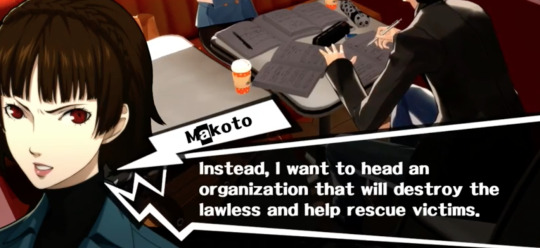
Within her confidant, the context is the host that was preying on her friend Eiko. Wanting to stop situations like that is good and makes sense 👍 The writers framed her decision to become a cop as a response to the most clean-cut black-and-white situation ever.
But here's the thing though: what happens when the lawless and the victims are the same people? Because in the real world, crime tends to concentrate among the poor and marginalized. The real world is not black and white. And I try to separate my personal experiences with the law from the media/art I engage with, but that doesn't work here because the game at large doesn't portray society as black and white.
There are a number of people in this game that do wrong because they have been hurt or are marginalized or did not receive proper help. A lot of mementos requests are about 'lawless' people and yet many are portrayed as 'due to systemic issues' or a lack of support or developing mental illness. It's also not a coincidence that Akechi is the most marginalized of all the phantom thieves and he was the one who did the most crime. There is deliberate social commentary here. People do not become lawless out of nowhere. They are shaped by their circumstances. And the game itself sympathizes with these people, focusing on changing/ helping them. The game's conclusion is that providing support and rehabilitation is the solution. Rehabilitative justice > Punitive justice.
Police wouldn't achieve that. Police in the game are framed as corrupt and incompetent at their core. Our protagonist is one of their biggest victims to demonstrate how they are weaponized against the weak. Even Sae Nijima at the end of the story has shifted to become a defense attorney rather than attempting to reform it (best character arc btw) because she recognized that the system is broken. And you can't even blame it just on Shido controlling the police because we see that the problems persist beyond him. By the end of the story they remain useless or outright harmful. The police do not help or rehabilitate, they only punish.
So no, this isn't me projecting my personal issues with cops onto the story because within the game's own story, law enforcement is not the solution. If it were a question of reform, we could debate about whether police reform is possible, but again: Makoto doesn't care about reform. It never comes up. According to the writers, she wants to be a cop because she thinks not enough lawless people are being punished. You can argue that her wanting to 'head an organization' means she wants to be in a position of power where she can reform them, but remember that police only enforce the law. They do not make the law. If reform was her goal she would be a politician. (I honestly thought that's what she was set up to be, since she was student council president and all but I digress)
Also a small detail, but notice how she mentions destroying the lawless before she mentions helping victims? It's super minor but I think it's indicative of the cop mentality. There's greater priority on punishing than helping.
I also dislike this conclusion to her arc because it's net zero character growth. You're telling me the character that was rebelling against corrupt adults' orders is now becoming a cop, the biggest bootlicking profession of them all? She started the story being a well-intentioned pushover, and she's ending her story being a well-intentioned pushover. And it doesn't matter whether she as an individual is a good person or not. All cops comply to be active participants in a system that is designed to hurt the weak and prop up the powerful.
TLDR: You do not help victims by punishing the 'lawless'. You help victims by helping victims. Period. Makoto becoming a cop is a contradiction of this and her own character arc. Either the writers did her dirty by not thinking this through or this is meant to be who she really is, and both those possibilities upset me.
#my post#now WHY did this happen? probably because atlus doesnt have consistent politics or because they dont have a political backbone#i saw a sensible take on this somewhere#that atlus' overall thesis re: society is that they think its broken but theres nothing else you can do but grow up and join it#that helping people is the goal but overall systemic reform is not#and yeah maybe im cynical but i agree that thats the case. feels like they dont wanna commit to an actual stance#i havent played the other games yet but apparently characters becoming cops happens in almost all of them#and its portrayed as something good and fulfilling despite everything#and yeah i think thats worth criticism esp if it contradicts the game's own themes#if you like makoto as a person then im happy for you but personally i disliked her writing. in terms of conceptualization and execution#i only described my issues with her cop thing but there's other writing problems that i wont discuss here#which is so sad to me because she had a great intro to the team. i had high hopes and they were crushed by bad writing#why does atlus do the girls dirty like this#ANYWAY sorry for the negativity 🥲 i dont usually do critical analysis posts. i really hope this doesnt upset anyone#persona 5#persona 5 royal#p5r makoto#p5r#p5r analysis#p5 analysis#p5 meta#p5r meta
10 notes
·
View notes
Text
youtube
Can't add the exact timestamp (it's at the end) but they just??? Jump off screen???? Do they not die???
My general consensus with this fight is that it's just extra content and... in-between canonicity. They don't show up in the credits (in a scene) regardless if you kill them or not, and the pupils are alive(?) or possibly some other ones are alive as they could just look similar/be reused sprites
long speculation under the cut
Fitzroy is lore for sure which contradicts some of the implications about trancending that we get but like. Royal is kind of a dumbass AND is being told all of this from mother/one concern. There's multiple implications of the "ancestors" (both isi and Him followers) coming from somewhere else/resetting the planet and leaving instructions/tech for their respective people to use. Fitzroy seems to fit in the between stage before the concern has studied the tech, but AFTER the Ancestors arrived/reset the planet. In The Tower and the Bastion there are images of famous earth landmarks (taj mahal, new York, pyramids I think) implying that some sort of Earth was destroyed/minerals drained (more connections to the themes about environmentalism) and that humanity was "reset". RIGHT BUT CANONICITY. Fitzroy is more lore... If u want him to be. The true past of humanity is still foggy ESPECIALLY with conflicting views from Him followers and the Isi. The concern claims to have longer records of history, and has aforementioned images, but they shape it to their beliefs and leave out certain parts intentionally as well as only educate people deemed more faithful (concern staff) and censor/mysticize parts for the common folk and ESPECIALLY city one residents. Cough cough 'merica haha but not really I doubt he was thinking about Americans specifically. This is more likely a commentary on religion specifically they larger ones and how they shape societies views and history! (Remember when we used B.C?) I'm not going to say this is an effective commentary or a scathing remark on Christianity (I believe that Christianity is used as a reference as it's the poster child to westerners for what "religion" is. He probably intended for this to be about religion as a whole but like. Come on. It's definitely Christianity with a few changes to make it a "generic religion" especially with the focus on punishment and ascension to a "good place". They also use sin/sinners a few times but that may be for familiarity especially since he had a whole npc for explaining terminology) that aside. Canonicity. Again. The history behind the Starworm followers vs the Isi is intentionally left a mystery! Fitzroy and Leticia are real as fuck (if u think they're canon) and provide some ideas for what actually happened in history but who knows! I should get back to my conversation I got distracted haha.
#text that should be about royal#iconoclasts#lore speculation#mothers corners#Youtube#long post#analysis#(?)#also feel free to reply my ideas are very foundational especially on the religion part :-P but I have a lot of thoughts on xtianity#Being seen as “what religion is”. Especially when not every culture uses the “good place bad place” idea#Or the nobility of suffering Or Or the focus on punishment and atonement#I do think elro is telling the truth with what they teach the lower class so I may use him as a point of reference in the future#He's also a really funny and interesting character. I also completely understand why people don't like him#I'm sorry for not having other examples but he is literally Walter fucking white#Oh my God for Halloween I should draw him in that costume. I have an old sketch of him as reanimator actually#I'm too shy to show it tho hehe... Also the only connection is “science” and “crazy syringe!”#Also by calling him funny I mean his actions are. I like how he gives up on his religion immediately...#Definitely only because it affected him personally (penance) but he probably wasn't that devout#If a follower anyways. Especially with Robin helping out. “Lol it won't get me!” >Wife and daughter die#A lot of his actions are absolutely caused by grief and I really like how he's written. I like the themes of grief!#He's absolutely an asshole tho ESPECIALLY to mina actually honestly to any woman in his life#Teegan get with a real man. Fuck that guy. Also counting grey as a woman in this instance. Woman in a lesbian way not as a gender#Teegan is the only person who survived elro besides robin#themes#Teegan has her shit TOGETHER. I saw her and Gustavo talking in the credits I hope they become good friends :-)#robin survived elro and like he won't try to protect/control her anymore but... God...#elro#(mentioned) (also I might talk about him in the future I really like how iconoclasts deals w grief)
3 notes
·
View notes
Text
.
#ive seen a few people who see the bordor situation the same way i do now#get told that they dont really understand the situation#i keep having it implied to me that i dont fully understand why they killed him#ive seen some people imply we think orym ashton and laudna are bad people#i keep having to make the same statements over and over again#'i know why they did it im just saying they didnt have to'#'i promise theyre my favorite characters im not attacking them'#'i understand that bordor did a bad thing im just saying he didnt deserve to die'#'i understand that bordor is not exactly the same as essek or kynan or whoever else im drawing parallels to'#i think early on when people start automatically turning any statement i make into discourse its easier to keep my tone neutral#after a week of this yeah im gonna get angry#i want to engage with this show the way that is fulfilling to me#thru media analysis#thru meta#by digging thru lore and searching for narrative themes and parallels#and WITHOUT FAIL every livetweet ends in a week of me fending off the most patronizing reply guys ive EVER experienced#maybe im fucking combative maybe im constantly discoursing but im fucking exhausted#i just want to enjoy the story i love the way i have always enjoyed stories i love#but everybody wants to debate me in a tone like i must not have actually watched the same episode they did#and then i guess i come off as irritable and combative and discoursey bc i get fucking fed up#like yeah sorry i dont 'just ignore' people when they talk to me like im stupid irl either#and my friends/mutuals/followers who DO see it my way are getting the same shit and that pisses me off too#so yes i am gonna get snarky and lose my patience i am never gonna be that nice of a person that i can just keep a neutral tone and#repeat myself over and over#every day i get on cr twitter and have to be immediately on the defensive#and all i want to do is look at every character choice under a microscope all day
6 notes
·
View notes
Text
The Prince of Egypt vs. The Disney Renaissance
Originally posted September 13th, 2014
The Prince of Egypt is a criminally underrated film. It performed decently at the box office, but Mulan still beat it out by $20 million. It was only nominated for Best Musical or Comedy Score, and Best Original Song. I consider this just as phenomenally idiotic a decision as the Academy’s decision in that same year to award Shakespeare in Love with Best Picture instead of Saving Private Ryan. Oh, and The Prince of Egypt didn’t even win best original music. Shakespeare in Love won that one too.
But the failings of the Academy in the 1990s are a subject for another day. Instead of talking about that, I’m going to talk about how The Prince of Egypt is a better film than any of the films released by Disney during the Renaissance. To do that, I will go through each film released and analyze their strengths, weaknesses, and why they ultimately fail compared to The Prince of Egypt. I’m going to start with the film I feel is the strongest film of the Renaissance (The Lion King) and work my way down from there (ending with Hercules and Beauty and the Beast). So, let’s get down to business.
The Lion King
And now it’s time to cause some controversy. First off, The Lion King was the best film Disney released during the Renaissance. While I understand that that is not a particularly controversial opinion, I do understand that some people view Aladdin as a superior film, and I understand and respect your opinion. It doesn’t matter though, because The Prince of Egypt is better than The Lion King in most every way. So, let’s divide this argument up into the four parts of a film that determine its greatness: Characters and Characterization, Theme, Cinematography (or in this case, animation), and Music.
Characters and Characterization
Simba and Moses are both well characterized, and provide interesting looks at surprisingly similar situations. Both run away from home after their father dies, or finding out their father is evil, respectively. They both abandon all responsibility for their people, and after a supernatural experience, they both return to set their oppressed people free. Both are well acted too; Val Kilmer sells Moses as the trickster younger brother perfectly, while Matthew Broderick delivers a perfect rendering of Simba as a king who comes back to reclaim responsibility for his people. So the protagonists are just about even here.
Where The Prince of Egypt succeeds over The Lion King is in its characterization of both antagonists. Scar is a worthy villain, to be sure, and Jeremy Irons delivers a phenomenal performance as well, but Scar is ultimately a much simpler villain than Seti and Rameses. Scar’s crimes are wanting a throne he has no right to take, killing his own brother for that throne, and traumatizing Simba (and, by him, the audience) by falsely blaming him for his father’s death. None of these acts are anything less than evil, to be sure, but they are a kind of evil that stems from simply being an egotistical power hungry maniac.
Seti and Rameses, on the other hand, have completely different motivations. Seti, who is played by the wonderful Patrick Stewart, is a man motivated by a desire to build and maintain a great dynasty. To that end, he is perfectly willing to enslave an entire race of people and use them as the workforce for building the monuments he wishes to be remembered by. But the reason he is willing to do this is not because he is evil. No, Seti is willing to enslave the Israelites because he doesn’t believe them to be people.



As wrong as Seti’s beliefs about the Israelites are, it clearly comes from the fact that his entire kingdom has been built on the back of slave labor since before he came into power. His culture’s acceptance of slavery is given as his reason for enslaving the Israelites, and yet it is not used as an excuse in any way. In fact, his apathy toward slaves and slavery is the indirect cause of Moses leaving Egypt, since it spurs him to kill a man who was abusing a slave, and flee the country afterwards. Seti is a great, complex and multilayered villain, and he isn’t even given over to any of the villainous tropes you’d expect from the antagonist from an animated film. And guess what. He’s only present in the first act!
The second and third acts shift the duties of antagonist over to Rameses, Moses’ brother and Seti’s son. Rameses’ motivations are every bit as complex as Seti’s. After the fantastic chariot race scene, Rameses and Moses are both being lectured by Seti for their shenanigans, and Seti utters a line that perfectly defines Rameses motivation for the rest of the film: “One weak link can break the chain of a mighty dynasty.” Rameses does everything that he does because above all else, he does not want to be remembered as the Pharoah who killed his dynasty.
And Rameses isn’t demonized either. When he holds firm to his decision to not free the Israelites, having already had all but the final plague sent on him, there is a scene where we get to see Rameses and Moses talk fondly about their childhood. He is making an incredibly evil decision, and just generally being a jackass, but he is still the brother that Moses loves and grew up with, and the film makes sure to remind us of that fact. Then he loses his firstborn son, and this happens:
youtube
Yeah, that’s right, you just witnessed the most human moment an antagonist has ever been given in a (Western) animated film. You can maybe argue that Scar had “complex motivations” because he brought the hyenas into the Pride Lands, but the problem with that is that it’s nothing more than a headcanon. This moment, where Rameses concedes that he has fully lost his fight against Moses and Jehovah, is more real, more tragic, and more moving than any of the cliched villainous cheese that we are given by Scar. And I fucking love Scar as a villain, but in comparison to Rameses, he just doesn’t stand up. So thanks to its respectful and complex treatment of its antagonists, The Prince of Egypt beats The Lion King in characters and characterization.
Themes
The Prince of Egypt and The Lion King both share themes common to the Hero’s Journey. They both have a strong theme of taking responsibility, and of bringing people out of darkness, as well as themes of the importance of leadership and believing in one’s self.
The overarching theme of The Lion King is quite to The Prince of Egypt’s as well. The Lion King is ultimately about Simba taking on the responsibility that was placed on him at birth, and learning to accept his unavoidable destiny as the King of Pride Rock. This theme is also complimented incredibly by the inclusion of Timon and Pumbaa, who both try to get Simba to ignore his destiny and live a life of peace, solitude, and “no worries.” When Simba and Nala meet again however, he is thrown out of his unworried state and forced to confront both Rafiki and his father, who urge him to “Remember who you are.” Simba then returns to Pride Rock, confronts Scar, and proves himself to not only being the rightful king now, but having always been the rightful king of Pride Rock.
The Prince of Egypt’s overarching theme is also ultimately about Moses accepting the responsibility thrust on him at his birth. However, unlike Simba, Moses’ time away from Egypt is not seen as wasted time. God makes it clear to Moses that his fleeing Egypt was just as much a part of His plan as Moses being found by the Pharoah’s wife. On the other hand, Simba living with Timon and Pumbaa is treated as a mistake by both Mufasa and Rafiki, and it is made fairly clear that he never should have left Pride Rock. You can even gather this by comparing the songs for these two sections. “Hakuna Matata” is a song about wasting time and having fun, whereas “Through Heaven’s Eyes” is a song about accepting your place in the world by looking at your life through the lens of a higher power. Essentially, in The Prince of Egypt, God and his plan are both in complete control at all times, whereas in The Lion King, people have the freedom to go off the track of their destiny, but inevitably they will end up where they’re supposed to.
The idea put forth by The Prince of Egypt is simply a better idea, especially in storytelling. Themes of destiny only really ever work when they incorporate personal choices into destiny itself. Where The Prince of Egypt goes out of its way to make it clear that even Moses’ weakest moments were still part of his destiny, The Lion King makes it clear that Simba’s attempt to avoid destiny was futile, and ultimately wrong, and what that ultimately means is that the film goes out of its way to waste our time with Simba’s experience outside of the Pride Lands. Now, don’t get me wrong, Simba grows during this time, and ultimately becomes the type of person he would need to be in order to return, but the film still makes it clear that not only was Simba’s time with Timon and Pumbaa a waste for him, but for us as well. And that sucks, because I really like Timon and Pumbaa.
Animation





Point made? Point made.
And to any of you naysayers out there who want to bring up the fact that this animation was only possible because The Prince of Egypt incorporated CGI in with traditional animation, whereas most of the Disney Renaissance films (including The Lion King) relied solely on traditional animation, I ask you, how the hell does that change anything? It’s not like Disney refused to use CGI to enhance later projects (like Tarzan and Treasure Planet), and honestly, it doesn’t change the fact that The Prince of Egypt has the best animation of any Western animated film.
Music
youtube
You’re gonna have a really hard time convincing me that Circle of Life is better than that opening.
youtube
Or that Hakuna Matata is better than Through Heaven’s Eyes.
youtube
Or that Be Prepared is better than Playing With the Big Boys.
youtube
Or that any song from The Lion King is better in any way than When You Believe. This is admittedly the most subjective category, but I do believe that the music in The Prince of Egypt is much stronger than the music in The Lion King. If you disagree, that’s fine, but I’m still marking it as a win for The Prince of Egypt in this category.
The Verdict
The Prince of Egypt won in each category. So, it has to win, right?
Of course it does. And you should watch it, in case you haven’t already. It’s a great film that really exemplifies Western animation at its best, and even if you disagree with me about it being superior to The Lion King, it is a phenomenal film that will forever remain one of my favorite movies of all time.
If you liked this, consider supporting me on Patreon, or donating to my Ko-Fi.
#disney#disney renaissance#film criticism#the prince of egypt#the lion king#sep 13 2014#you know this one isn't half bad#i don't care much for the way i frame it as Prince of Egypt versus Lion King#but as a love letter to the prince of egypt#a film i still adore#i think this is pretty good#and i do some cogent character analysis of moses and rameses#reading this honestly makes me want to revisit this film in my writing#there's a lot of its themes of faith that i really appreciate#and as someone jewish but separated from that heritage#it's a film that makes me feel much closer to that culture i often feel distant from
7 notes
·
View notes
Text
@deadendtracks, @shinelikethunder
Funnily enough, I had a bit in my post that I deleted abt how it feels like Sam and Dean switch places from early to late seasons, just as you both lay out here. (I still think about how Dean’s monologue around feeling angry from 15x09 sounds almost exactly like Sam’s monologue about his anger in 5x11!) The loss of nuance & duality bugs me too, and “clumsy reassignment” is good way to put it. It’s also... hard for me to take this reassignment charitably, when I look at the broad broad picture of the show, and at the very least it’s just not enjoyable in the same way the earlier seasons are. But silver lining, it does make me appreciate the early seasons more in contrast.
#replies#this was also a nice little convo to come back to after a way long day at work :)#i think the fandom also ignores how the themes/ideas from early to late seasons DO change#because fandom mostly focuses on character over any other aspect of the text#which is great for fic writing; but can be really bad for media/textual analysis
2 notes
·
View notes
Text
SHOOTING DEATHBEAMS AT SETOMARY WEIRDOS ugh kagepro has amazing dynamics that so many people want to ruin soooo badly by being WEIRD. like no they are not going to get married do not be fucking weird..... anyways their dynamic is amazing can you imagine if your friend from when you were 13 continued to look the exact same? wouldnt that be fucking crazy? time passes and you grow up and get jobs graduate uni whatever and your friend is unchanged. that is so interesting but people want to make it WEIRDDD. but anyways yeah i love these two. an unchanging pure love is so good.... the love between friends when youre young is SO....
also this is only tangentially related but this is why im a Short Haired Mary Truther like post-STR mary REALLY SHOULD have short hair. cuz like that shit burns off when she goes medusa mode and it only grows back when she resets time.... but post-STR will be like the One Time she doesnt reset time. so it should stay short. and also itll be The one aspect of mary that Actually Visibly Changes.. and kido cuts her hair short for herself obvs but also to grow her hair out with mary. yes. this is my truth.
#bck to setomary. bc like people change as they grow up right and that isnt a bad thing but imagine if the close bond u had with a friend#from your youth is unchanging. the same sunniness; optimism; and earnestness remains even after countless of years#wouldnt that be something like relief? going to stop myself from doing further character analysis here bc I NEED TO SLEEP#but this whole theme of change is very significant within the mekaquartet yes...... like the manga chapter where mary says shes the only on#who is unchanging; but it is said with a sad face#but kano in the lost day hour comic saying that a friend is something that doesnt change#WOOPPSSS LOOK AT THAT.... ITS KANOMARY AGAIN!#kind of. a little. but they really function as parallels to one another in the mekaquartet#AND THE IDEA OF CHANGE AND STABILITY AND HOW IT RELATED TO THE ISOLATION DERIVED FROM ABUSE AND TRAUMA BC CHANGE IS SOMETHING FEARFUL BC IT#CANNOT BE PREDICTED ANDDDddd im going to sleep. bye. BYE#kgprambling#seto tag#kanomary tag
0 notes
Text
why juni ba’s the boy wonder has my favorite jason characterization of any contemporary comic run: a needlessly in-depth analysis (pt.1)
oh boy oh boy am i excited for this one buckle up boys it’s gonna be a long one. analysis under the cut (WITH PICTURES!!)
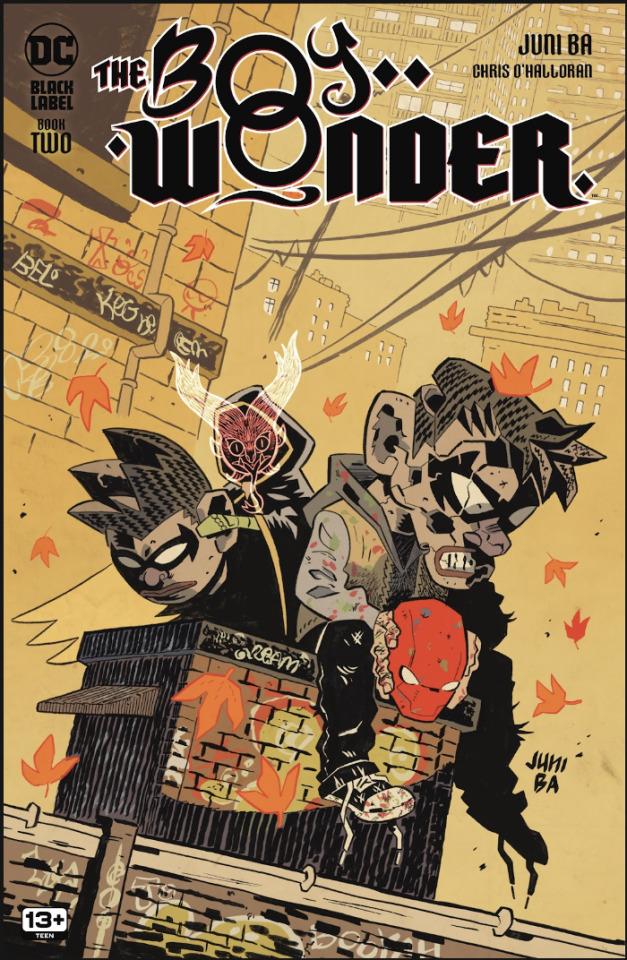
i, like many others, have many thoughts and opinions about juni ba's the boy wonder that i'd like to express. i was having trouble formatting my rant, though, so i decided that it was easiest to just address some of the common complaints i've seen about the comic and jason's characterization and insert my ramblings throughout it. so far i've seen three main complaints:
the typical boiling down of jason's character to "the angry one"
his lack of strategy going into the fight with the demon is out-of-character
the neighbor's kid interaction
to start with the first one-- when introducing jason's character, in both the second and first issue, ba uses the descriptors "coarse", "bitter", "hardened", "brash" and, of course, "rageful".
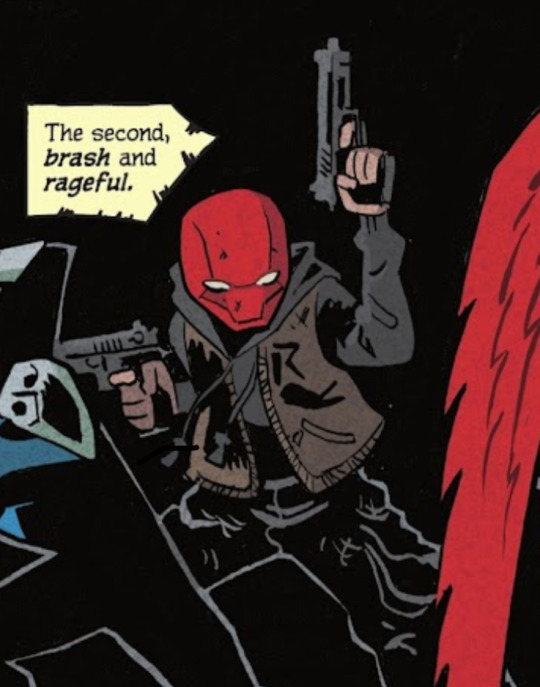
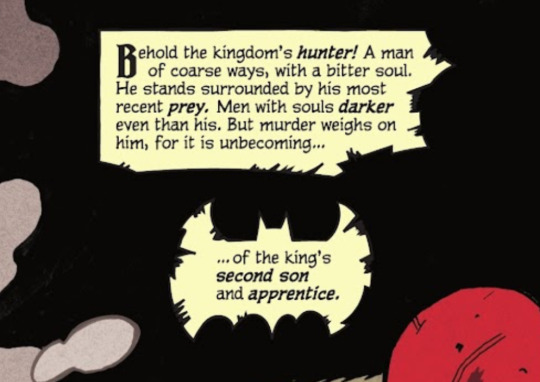
so, yes-- i understand where people are having issues with this characterization. however, even if it's overplayed, it's still important to remember that jason is angry, and is driven, in part, by his anger at bruce and the joker. and, as ba highlights, he deserved to be! completely erasing jason's anger is just as bad as defining him with it.
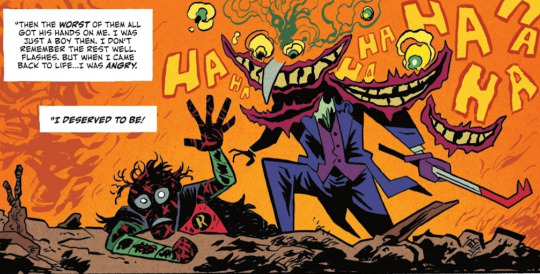
i also don't think it's wholly accurate to say that ba is boiling jason down to just his anger. it might seem like that when only considering the dialogue and narration, but jason's behavior in the comic doesn't perfectly align with how the narrator describes him. while the narration describes him as "rageful" and could be an instance of generalization, jason's actions throughout the comic are more aligned with two other emotions/motivators: fear and despair. we never see jason get actually, properly angry; the closest we get is when he's seemingly annoyed by damian (which i believe could be performative) and when he becomes violent, accidentally hurting damian.
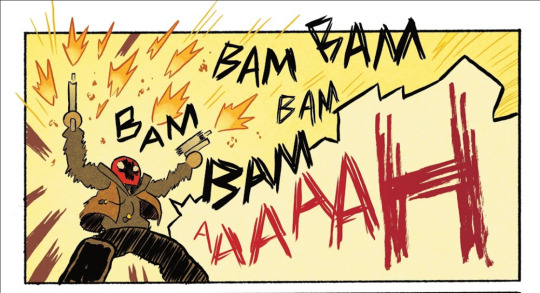
even in this instance, though, he is not driven to this violence by rage, but rather fear. so, while ba states in the narration that jason is driven by his anger, he contradicts himself by highlighting how jason's sadness and terror motivates his character. this could be interpreted as lousy writing on ba's part, but i'm not going to attribute the paradox to that inference. to me, it actually represents a critque of the "jason is the angry robin" generalization, because it calls to attention the discrepancies between how one is described versus reality, an issue that jason both faces in the comics (bruce using him as a cautionary tale when dying WASN'T HIS FAULT) and outside of the comics, as mentioned previously.
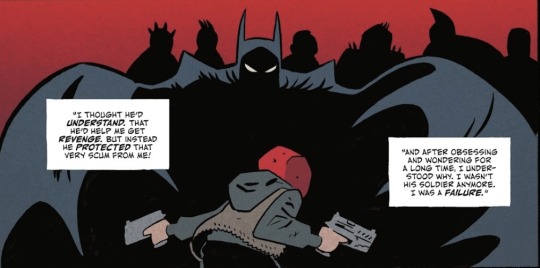
furthermore, this highlights the difference between what jason believes about bruce's perspective and bruce's actual perspective (according to damian). jason believes himself to be a "failure", but damian refutes this by describing his conversation with bruce concerning jason, a conversation that does not align with jason's belief. if you couldn't tell by now, perception versus reality is a BIG theme in this comic (and for jason's character in general!)
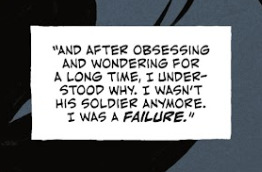
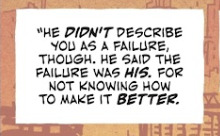
i was really fascinated by ba's take on jason, because it veered pretty far from a lot of contemporary comics, most of which do, unfortunately, play with the angry robin jason generalization. they've been doing a bit with his fear, too, which has either been pretty fun or the most awful thing ever (i'm looking at you zdarsky. gotham war was fucked up), but what makes ba's jason stand out to me is how he grapples with his grief.
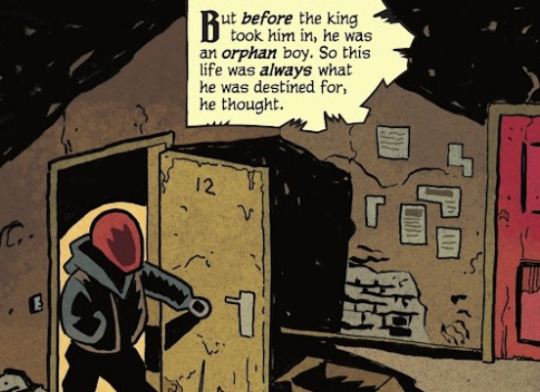
this boy is so sad. ba's jason might actually be the saddest rendition of him i've seen in canon content. we've seen jason grapple a little bit with the despair rooted in his death and resurrection, mainly in lost days, where he cries 3 (?) times, fresh out of the pit and very traumatized.
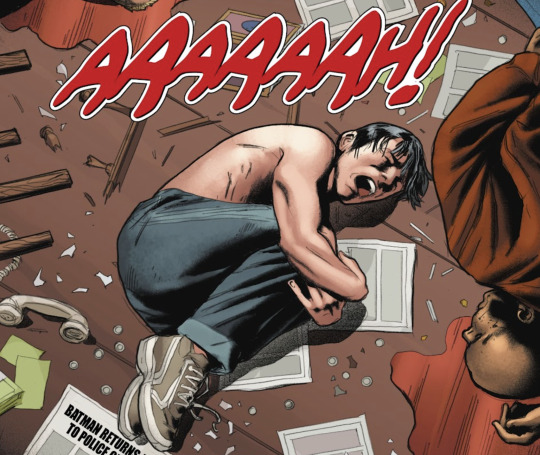
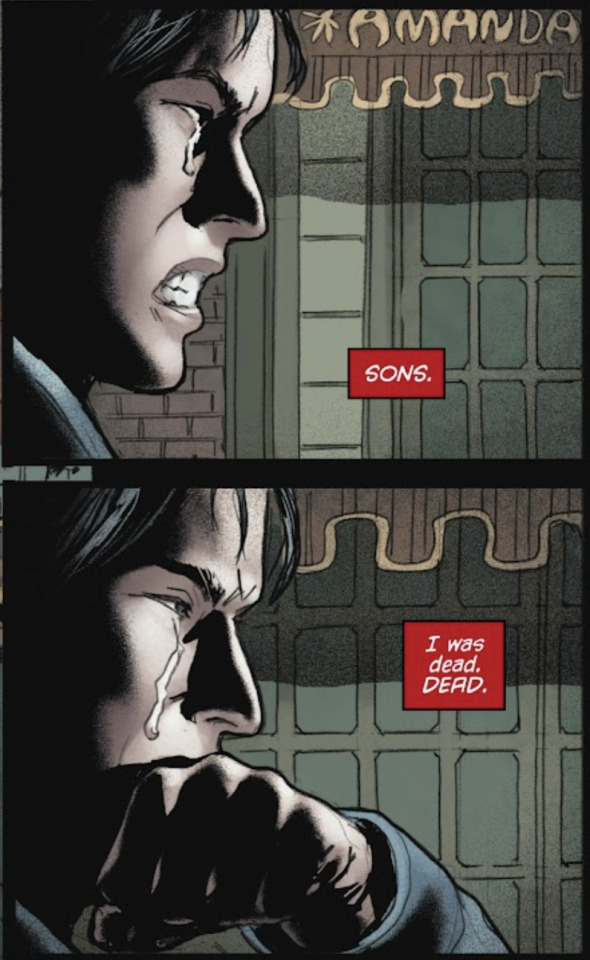
even in this comic, though, he reacts to his grief with anger more prominently than sadness. that obviously doesn't mean the despair isn't there, though-- anger is just an easier outlet for it (which i could really get into the masculinity aspects of that, but then this would be wayyyyyy too long).
ba's jason, though? that motherfucker is so. sad.

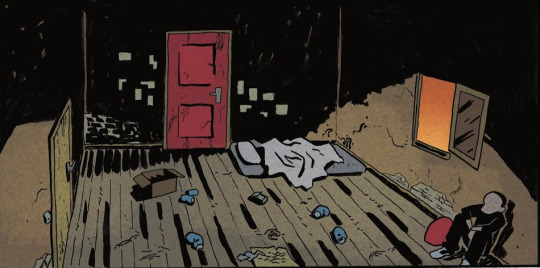
christ he's depressing. AND THAT'S SUCH A FRESH PERSPECTIVE!!!!!!! THANK YOU JUNI BA!!!!!!
now i'm pretty sure some people would argue that this rendition in out of character because he's so sad. to me, though, he's still the same jason; he covers up his sadness with anger and pettiness, redirecting his own insecurities onto those around him to mask his true feelings.
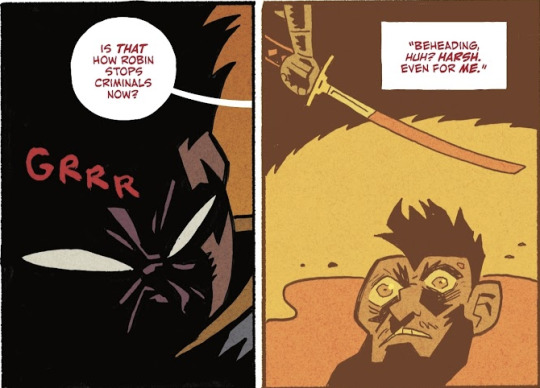
ba quite literally illustrates this in the comic. whenever he is being his snide, normal self, he has his red hood mask on; but when he actually opens up to damian and expresses himself truthfully, the mask is off. ba is highlighting how the classic jason anger and bitterness is, in part, a performance and coping mechanism.
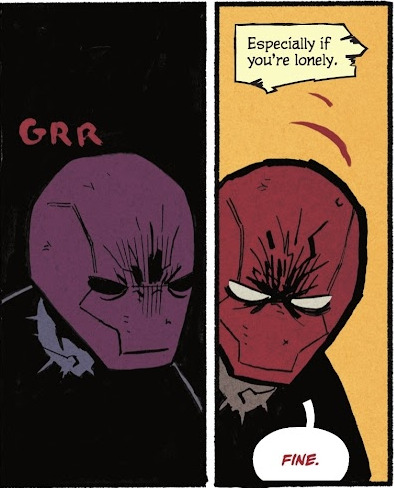
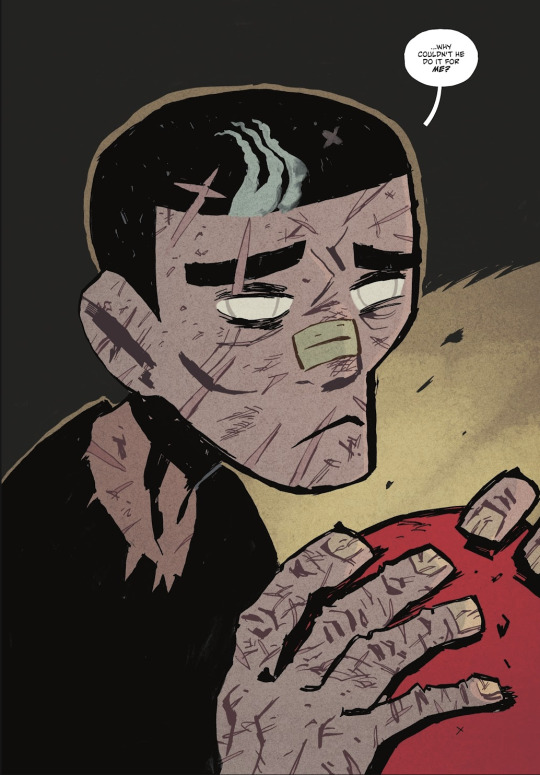
this post is already too long, so i'll go over the two other critques in a different post, which i will link below (eventually). if you guys have any thoughts you'd like to share or discuss, my dms and asks are completely open! if you made it this far, i hope you enjoyed my ranting. look out for another post soon! :))
part 2 / part 3
#using my english major for evil#this is very different from stuff i usually post so i hope you guys like it#i had a blast writing it#dc comics#jason todd#batman#dc#robin#red hood#batfamily#batfam#damian wayne#red hood: lost days#the boy wonder#juni ba#dc meta#jason todd meta#the boy wonder meta
750 notes
·
View notes
Text
Stan Pines: A Masterclass in Character Writing and Symbolism AKA Stan is Godly, Literally (GF Writing Analysis Pt. 5)
If you're interested in reading a similar writing analysis on Ford Pines, please visit this page.
I've wanted to write a post on Stan for a long time, because I'm going to make a bold claim: he is THE best written character in Gravity Falls. I literally have never been able to find a flaw with his writing, and the reason? Not only does he have the markers of quality I mentioned in my post about Ford's writing (a want, need, character arc, realistic flaws), but...
I would also argue he is THE main protagonist and hero of Gravity Falls if I had to pin it down to just one, and his character arc matches the external conflict, that being Bill Cipher and the theme of growing up vs. staying in childhood and ego vs. selflessness, in ways that are just - and I'm not exaggerating - poetic. And the best part is, he had a lot more time and attention in the spotlight in the show than Ford, so everything I mentioned in the other post that was good about Ford's writing, ramp that up x100 for Stan.
His character also touches on multiple other fantastic themes: breaking generational trauma, healing broken familial relationships that seem unfixable, redemption, the misunderstanding of the family "fuckup" (although Stan is not that in the least, but that's part of his character arc), positive masculinity, true brotherhood, self-love, self-identity, and probably a million others I'm missing and will find out even just as I write this.
As for the godly part, well... you'll just have to read to the end. And no, I'm not kidding or exaggerating, either.
Okay, okay, gushing aside, let's get to the analysis. I'm not sure this will be as neatly structured as Ford's was, but there are just so many damn good things about Stan's writing that it's hard to stick to just one point. Let us begin.
Stan's Backstory: I Am Not Ford and That's Bad + Protecting/Providing for Family > Everything Else
So as I discussed in my post about Ford linked above, much of Stan's childhood revolved around Ford. His entire existence as a child was summed up by one question: how do I compare to Ford? This is especially emphasized in how their father, Filbrick, treated them. One of the end credits ciphers in the show reads as follows:
"A STUBBORN TOUGH NEW JERSEY NATIVE, FILBRICK WASN’T TOO CREATIVE, HAVING TWINS WAS NOT HIS PLAN, SO HE JUST SHRUGGED AND NAMED BOTH STAN."
Haha, very funny. But OUCH. Imagine knowing that your whole name is your name, was because your father only expected one son and was too lazy to come up with anything else. So literally, Stan doesn't even have his own name - his own identity - technically. Stan also was apparently the second twin born, so came in "second" even from birth, and being Ford's (either identical or very similar fraternal) twin, well... it's hard for someone to untie their identity from their brother's with those factors surrounding them as a kid.
There are many other factors that illustrate my point (Ford got Filbrick's name as his middle name, the way Filbrick literally put Stan on the lawn for sale as a kid for failing a test, etc). All in all, Ford receives their father's love, Stan does not, although we could argue that this isn't that great for Ford, not really, as I did in my post on his writing. Because it's a love that comes with a, "I'd also like to use you." attached (just like Bill, gee).
All in all, it's very obvious from all these context clues that Ford was the beloved one, and Stan was the unexpected one, from birth to the end of Gravity Falls, where he uses that to his advantage - albeit in a different context - to defeat Bill Cipher.
Worse yet, Stan happened to have a twin that was extremely smart and talented in a way that was easily noticed. Ford is a Golden Child, as I described in his own writing analysis post, and siblings of the golden child like Stan? Well... the other sibling(s) are often the Scapegoat. As the source in the last sentence states, the Scapegoat is "often blamed for family mistakes, discarded, neglected, and has been gaslighted into believing it was their fault. The scapegoated child is usually assigned at a young age and often carries this role through to adulthood and never loses the unfortunate title.". This can highly affect the Scapegoat's self-esteem, even into adulthood.
This page also covers the Golden Child vs. Scapegoat dynamic. Pay attention to these quotes from this source:
"You are the one the parent will come after when things are going wrong."
"You are subjected to their emotional and verbal abuse the most."
"You may even feel like you need to fix your broken family."
Also, take into account these panels from the comic, Lost Legends, released after Gravity Falls ended:
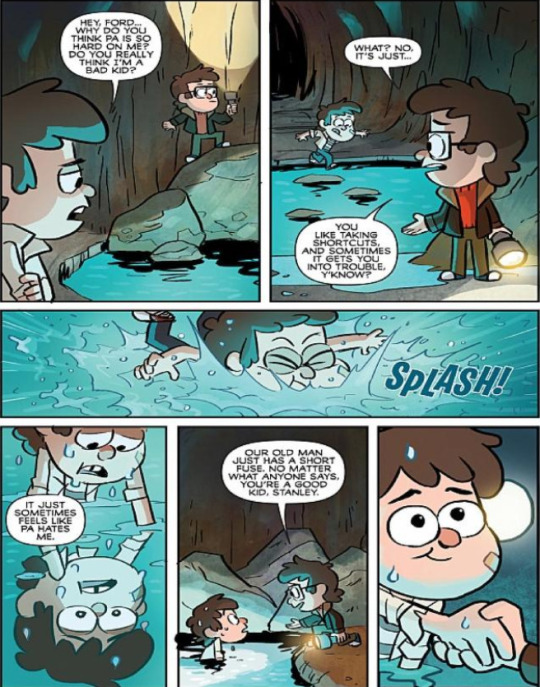
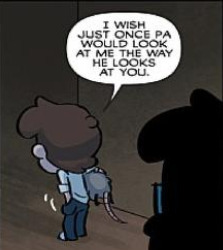
Yikes. A child doesn't say these things unless a parent has taught them that everything they do is wrong and they are lesser than their sibling. This kid's noticed how Filbrick looks with pride at Ford, but not him. And here's the thing: the item Stan stole in this comic that made Filbrick mad? Stan did it to clean it to make his father proud. Sound familiar? In the events of Gravity Falls, Stan works on the portal for thirty years and gets Ford back, and he gets... yelled at for it. Stan always has good intentions. Although, Ford has a point in the above comic panel: Stan does take shortcuts that get him into trouble. He did almost get jailed by the US government and end the universe to save Ford.
But this is a consistent theme with Stan's character throughout the show. Even WE as the audience first see Stan the way his family did - a conniving scoundrel and money-grubbing criminal - but through the events of the show, just as Stan's family starts to realize it, even when Stan does things that seem bad, like stealing radioactive waste, working on a portal described as a potential cause of the end of the world, has a ton of different identities, etc... we find out Stan had good intentions all along.
Even Stan's greediness? That need for money? That also stemmed from the same good intentions, because how ELSE was he going to afford Ford's mortgage to keep the Shack in order to keep working on bringing him home? It was also likely something ingrained into him from when he was kicked out. Because Filbrick told him, basically, until you make us the money that Ford losing his chance at West Coast Tech cost us, GTFO. Literally. :'(
So Stan... really IS not what he seems. He seems like a fuckup, a criminal, a liar, and a greedy conman. But really... he's a family defender, protector, and supporter. Want to have your mind blown? Intentional or not, let's look at the very first scene we see Stan in in the series:
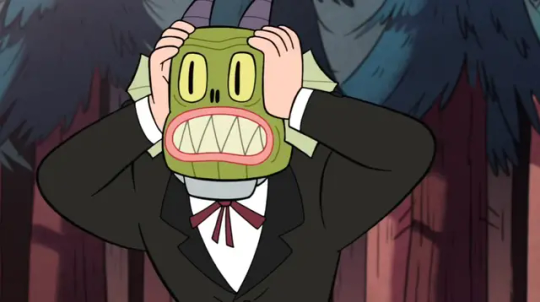
"Oh look, I'm a monster!"
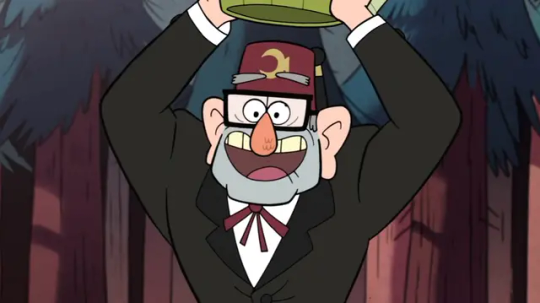
"Just kidding, I'm not. I'm someone else under what looks like a monster."
Yes. Stan's whole character arc is foreshadowed in like... three seconds in the first episode. The very first time we see him. Not just his arc, but also his role as someone that seems deceptively evil but is actually good. And not just the arc that Ford and Dipper take from distrusting Stan to finally understanding his good intentions, but also the realization WE as viewers have about Stan as we follow the story.
Additionally - which we'll get into later - it's symbolic of Stan's internal character arc he takes across the series of realizing he himself isn't the monster that his father planted in his mind as a child, but a good person worthy of love.
All of that... in a few seconds of animation. If that wasn't intentional, then DAMN did the writing gods smile on the Gravity Falls team the day they planned this scene.
Back to the point about who Stan really is: the family "fuckup" (not really, but we'll get to that later), and a family defender and protector. This is the true core of Stan's character throughout the whole series. Not only was he Ford's defender as a child, protecting him from bullies, but you know those scenes the fandom universally agrees on were Stan at his most badass? Ahem...
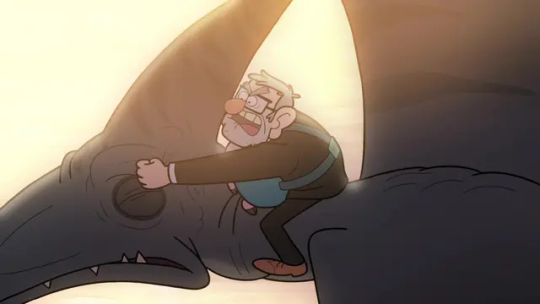
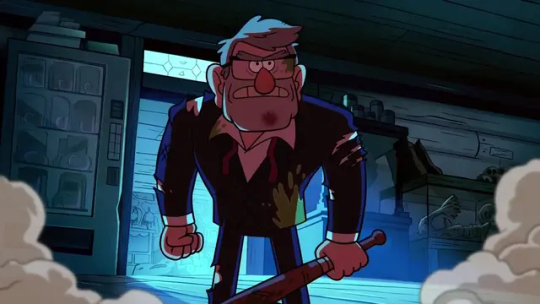
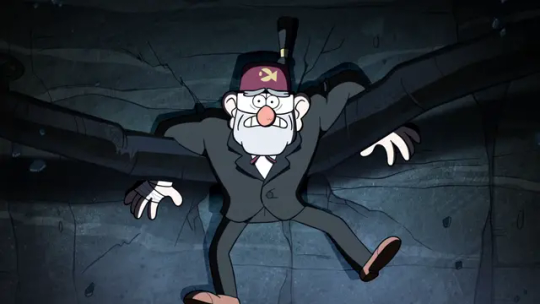
"Everything I've worked for, everything I care about, it's all for this family!"
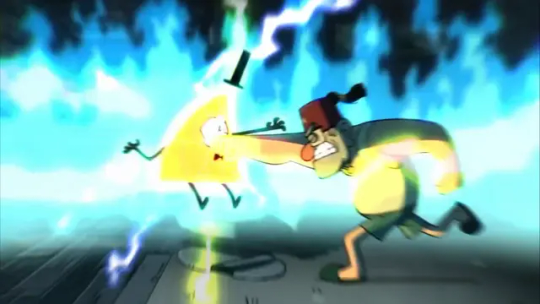
"Turn around and look at me, you one-eyed demon! You're a real wise-guy, but you made one fatal mistake: you messed with my family."
Yeah. Look at what Stan is doing in EVERY single one of these scenes: protecting his family. And as bad as Filbrick was, just like I explained in the post I made about Ford's writing... Filbrick also passed down some things to Stan that make him the hero he is. And it's also stuff that Stan passes down to Dipper:
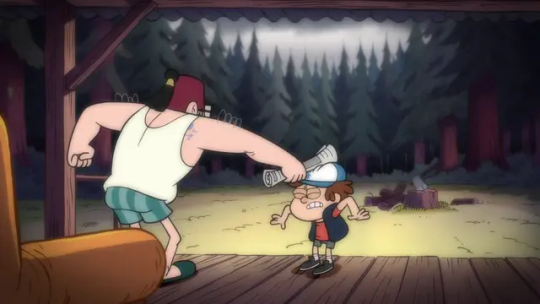
Yeah, it kinda sucked for Dipper at the time. Was it a perfect way of teaching a child to be tough? Er, no, although another mark of a well-written character is that they can make mistakes and have flaws; Stan's not perfect. And the fandom has criticized the way Stan passed down this lesson to Dipper, because it can be considered very similar to the way Filbrick passed it down to Stan. But look what it did: when the world fights and threatens his family, just like Stan, Dipper fights back. With punches, too:
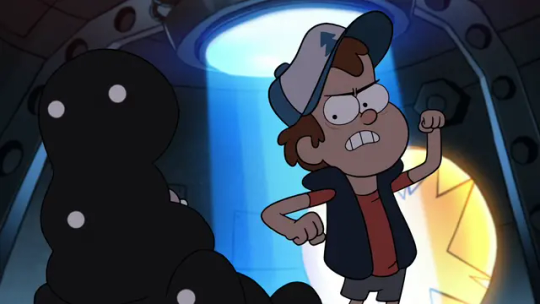
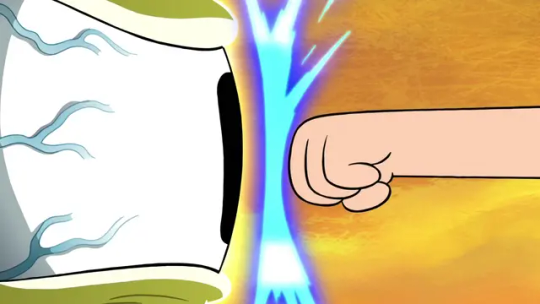
So... to summarize this first part:
Stan was taught from childhood "I'm not Ford, and that's bad. I am a monster unworthy of love that always messes up.", and his role is a family protector, which started with how he protected Ford from bullies as a child. This is the core of his self-identity. So let's get into the writing techniques that make a well-written character that I discussed in Ford's writing analysis post...
Stan's Core Want vs. Need
I'll quote my explanation of want vs. need from my own post on Ford I made about a year ago:
"When I took writing classes in college (and over years of writing in general and drooling over writing advice podcasts and blogs), I found that the best method for me, personally, when it comes to crafting characters is to focus on two major things:
1. Their want.
2. Their need.
On the surface, these look like the same things, but in character writing, they can be vastly different. For example, say that you have a character that greatly desires fame and recognition. They want these things.
But what’s the real reason behind it? Is it because they had a parent that was famous and want to live up to their example? Is it because they want to be adored by people? Is it because they were told they’d never amount to anything by someone and want to prove them wrong?
This real reason behind it all is the core need. Yes, they want fame and recognition, but they need it because, say, they have low self-esteem and need copious amounts of outside validation to boost it.
Tied to this need is usually a backstory reason (sometimes called their wound). Say your hypothetical character was bullied a lot as a child. Or abused by a parent. Etc. Whatever the wound was, it caused a big, painful hole in their heart that they try to fill and fix with their want.
So they go on a journey. The want is often the external journey. The need is often the core journey / character arc. Our example character seeks fame and recognition on an external journey, but deep inside, they realize they need something else, which is to understand that their past trauma/wound doesn’t define them, and fame and recognition will not be the balm they expect it will be. Often, they realize they had what they needed all along. They grow past their flaws associated with their seeking this want through understanding and instead pursuing the need."
I'll summarize Stan's character writing using these concepts right here, like I did for Ford in his analysis post:
“I want to be Ford because I want to be loved like he is, and I want to protect those I care about and do the right thing. But what I need is to realize is that who I am - not Ford, but Stan - was good enough all along, proven by how I've always protected those I care about, and I never NEEDED to be Ford in the first place. This stems from a wound from my childhood where I was a scapegoat child treated like a fuckup who never did anything right and could never measure up to Ford, and was conditioned to think that being like Ford was a ticket to earn familial love. I had what I needed all along: myself, because I am good enough and worthy of love, despite what my father taught me."
Stan's Arc: I Am Not Ford... and That's Okay
AKA Stan's arc is basically: learning to love yourself and be yourself, even when you were conditioned to think you have no value. Don't believe me? Guess what Stan does for thirty years: pretends to be Ford. And he literally does it by pretending to have died. He "kills" Stanley Pines AKA himself in a staged car crash to become Stanford Pines.
And guess how he defeats Bill? By pretending to be Ford. His greatest weakness is actually his strength, and then he flips it: he reveals to Bill that he's not Ford, he's actually Stan. And THAT'S when the antagonist of Gravity Falls is truly defeated - an antagonist that represents stasis, lack of change, and with The Book of Bill's context, an antagonist that never freed himself from his own past - is when Stan learns to accept himself and admit who he really is and learns to let the past go. And it's telling that this is what he says when he does it:
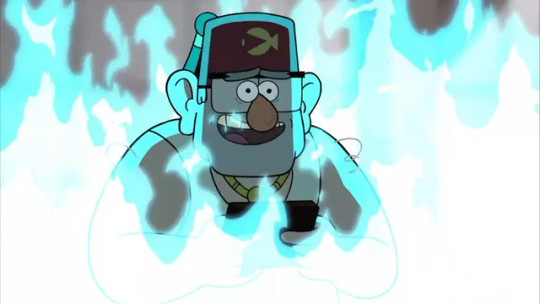
"Heh. Guess I was good for something after all."
AKA: "Yeah, fuck what Pa said about me."
There it is. The moment of Stan realizing his father was wrong, and he was wrong for thinking himself a fuckup all those years. And this is the expression he pulls at this moment of realization; at the peak of his character arc, all while burning in flames like a phoenix reborn. It sounds corny when I put it that way, but LITERALLY, all the fire symbolism feels like it wasn't foreshadowing Stan's death, but his rebirth as himself after pretending to be Ford all those years. He's not burning who he is, he's burning away who he thought - who he was told - he was. Funny that it takes place in the mind, huh?
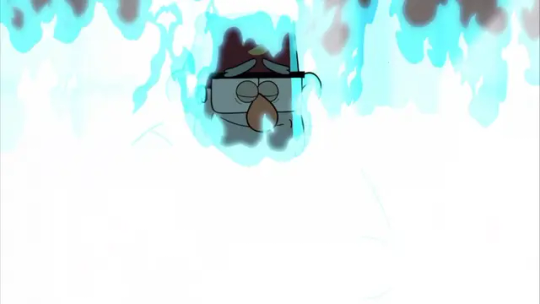
This is the face of a man who is at peace and finally loves himself for the first time in his life. That ain't just his mind burning. That's him punching his demon that's haunted him and his brother their whole lives, protecting his family as always, and, symbolically, punching a demon that represents the show's overall antagonist of the shackles of staying stuck in the past, forgiveness, and the value of moving on. He literally punches the antagonist - staying stuck in the past - to pieces and THAT'S when he wins.
Also, can we talk about how Bill and Filbrick share color schemes, and Filbrick even has a brick-like pattern in his suit (also, I mean... come on, he's got 'brick' in his name)? I'll let you make your own conclusion about what that means for Stan's character arc:
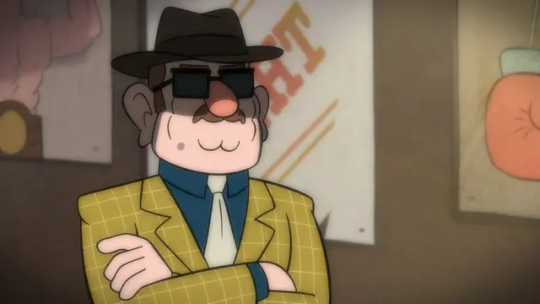
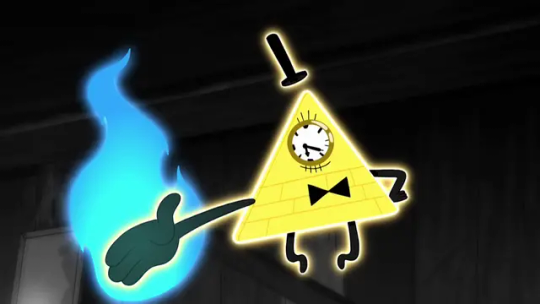
It's also telling that Bill Cipher's backstory is that he burned his home dimension and loved ones - including his family - to ashes. The Axolotl - Gravity Falls' equivalent of basically God, from what I can tell - says himself about Bill in one of the books released outside of the show:
"Saw his own dimension burn.
Misses home and can't return.
Says he's happy. He's a liar.
Blame the arson for the fire."
Bill misses home. He wants the past and to hold onto his family, just like Stan and Mabel do. Isn't it funny how whenever Bill shows up... time stops?
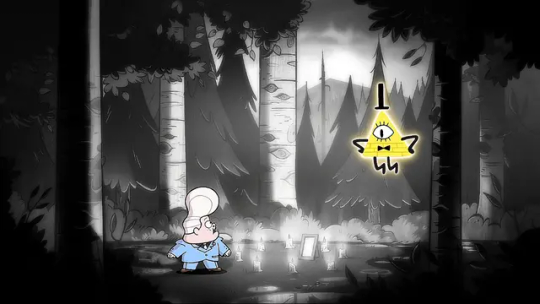
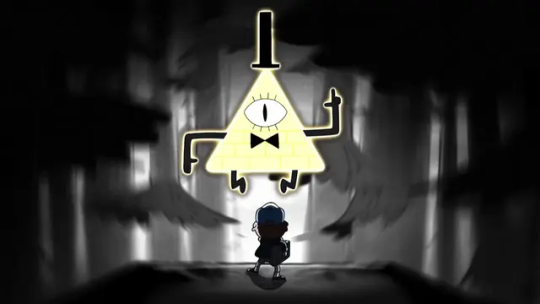
And look what Bill says in Weirdmageddon: "This party never stops! Time is dead and meaning has no meaning!"
Time stopped. He just wants fun. He's almost like a child that never grew up. And... look at what it was that Stan wrecked in A Tale of Two Stans as a teenager:
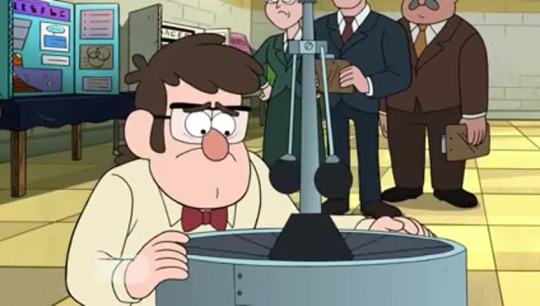
A perpetual motion machine. That thing that's not supposed to stop, just like time. Stan 'breaking' time by wanting to hold Ford in the past, with him, instead of leaving him to go to college while Stan was stuck in the past/Glass Shard Beach? That's what broke their brotherhood.
But what makes Stan a hero, and Bill a villain, is that he lets go of the past and his childhood. Bill never does. And he's defeated when Stan lets go of the past, something Bill never did. Why? Because he has family to make facing the future easier. He has familial and self love. Bill doesn't, because he killed his own.
(Sorry, got off track again, but Stan's arc and story ties so deeply to the other characters' and the main themes that it's hard not to take some detours, because it illustrates just how well-written Stan is. Gravity Falls' story IS his story.).
Wanna know something cute? Wanna know how Stan realized he had worth during that scene after he defeats Bill? Why I'm betting the show runners showed Stan clutching to a picture of Dipper and Mabel as this happens? I'll give you one guess why Dipper and Mabel are so important to Stan, and why he clutches to their photo even as his mind is burning apart in the finale:
They're the first family members since Ford (whose love he'd lost) who loved Stan for who he was, not for who they thought he should have been. Mabel trusting Stan in Not What He Seems is basically the first damn time Stan's heard in thirty plus years from a family member that, "Hey, I trust you have good intentions and aren't just a lying fuckup. You're not a monster. You're not what you seem.".
Also, he's protecting his family. That always makes him happy, too, of course.
Ego Death and the "Stan is Godly" Part
Yep, we're taking this analysis post train all the way to "damn this is deep and PrettyinPwn is likely crazy for noticing it" station. The only reason I'm tacking this part on is that I saw a Q&A with Hirsch recently that sparked my attention. He was on his The Book of Bill tour, and someone asked if there was anyone more powerful than Bill in Gravity Falls lore. Of course, Hirsch said the Axolotl, but what he said about what Bill vs. the Axolotl stands for caught my eye:
The video in question. The question and answer starts around 21:22. The quote I want to point out is, though, is what we learn about these two beings:
Hirsch: "Bill's weaknesses in terms of his overconfidence, his ego, and his lack of ability to focus on one thing at a time are things that a being that has no ego, thinks on a long scale, and does have empathy is actually stronger than him because of those things."
So when we boil the conflict of Bill vs. the Axolotl down to simple terms - what makes evil vs. good in the Gravity Falls universe - is this: ego and selfishness vs. no ego and empathy.
Guess which characters wrestle with these themes? The correct answer is: ALL of them. But especially Stan and Ford. This is really what their conflict is about at the core. They both struggled with ego and selfishness, and that's when - in the story - they lose most. But they win when they choose selflessness and empathy. When they... drum roll, please... partake in ego death.
Well, let's describe an ego death. First, we must define what an ego is (source for all of the following quotes):
Ego: "The ego is a sense of self that you develop at a young age." and, "-relates to your feelings about your own importance and abilities.".
*cough "I'm the family fuckup and poor man's version of Ford because that's what people taught me to believe in my youth." cough*
And an ego death "-is the (often instantaneous) realization that you are not truly the things you've identified with, and the "ego" or sense of self you've created in your mind is a fabrication. In some instances, it can offer a profound feeling of peace and connectedness with all that is, as the walls of separation the ego creates come crumbling down."
*cough "I'm not Ford's poor copy, I'm not a fuckup, I have worth, and I realize this in my literal mind as I pull this expression-

-of total peace as the walls of my mind literally BURN around me" cough*
And, "When one comes through on the other side having released all the things they've identified with, with only their true spirit left, Kaiser says, they begin to live from a place of pure love."
*cough "I'll hold a picture of the ones I love and realize self-love as my mind burns around me because this is who I really am: a man who protects and loves my family and my family loves me" cough*
Cheeky asides, well... aside, are you seeing what I'm getting at, folks? Look, I can't prove that Hirsch and crew intended all this, but in my opinion: you wanna know why there are so many gags of Stan or versions of him melting or burning in the show? Why fire is such an important symbol surrounding him? Why there are so many times he's killed his own identity and became a "new" man again and again and again, be it as a young grifter, or as a drifter who became his brother to bring him back again, or as an old man who "killed" his own mind to save the world and his memories returned?
Because it's ego death. The rebirth of true self from a lie you were living. That's literally what Stan's arc is a metaphor for. Even better, he reaches his character arc's zenith when he does this:

That's not an old man punching a stupid little bastard. That's an old man punching what threatens his family, punching his own past, punching his own demons, punching his brother's demon, punching his prior identity, and - given that we know that Bill is a symbol of ego now - punching the personification of literal ego and letting it burn. There are, let's count, seven symbolic meanings in that punch at the very least. Maybe eight if you count that the rightside-up triangle is the alchemical symbol for fire, and by Stan beating it, it's symbolism of his defeating the fire that's eating his memories AKA why he gets his memories back. I could find more, probably.
And yes, the chubby old conman we love so much - and is the opposite of spiritual both in action and in Hirsch's words (he's said Stan is an atheist as an adult) literally has a character arc where he attains spiritual enlightenment that aligns with the god of the Gravity Falls universe - the Axolotl, who has no ego as Hirsch said - hidden under many layers of symbolism. I don't know if Hirsch and the writing crew planned this with Stan, but holy damn... this is what I meant when I said that Stan is the best written character in Gravity Falls, even if this part was unintentional. There are just so many layers of meaning here.
And the best part? Stan was this hero all along. Everything we cheer him on for - be it punching zombies to protect his niblings or spending three decades of his life trying to get his brother back - is when he's being selfless and empathetic. We love Stan as a character because he has a big heart. He's a good person because, as we described above, he is - through beating ego in a universe where its god represents a lack of ego - godly.
No, fangirls, put the sexy Hunkle art down. I mean literally spiritually godly in the Gravity Falls universe, at least in the way good and evil is portrayed in the themes and worldbuilding. No, I'm not exaggerating, either. Let's return to that quote about the Axolotl's powers and why he's stronger than Bill:
"-that a being that has no ego, thinks on a long scale, and does have empathy is actually stronger than him (Bill) because of those things."
Well... guess what Stan does? He loses his ego so hard he regularly kills his own identity multiple times in his life and goes through a symbolic ego death, he thinks on a long scale (thirty years long), and is empathetic and selfless to the point of sacrifice. And the Axolotl in real life lore? Xolotl, the god of Aztec myth? Guess what he's a god of (source):

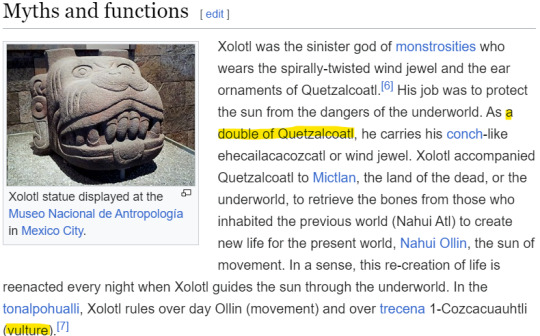
Why I highlighted "vulture"? Honestly, this is just a neat little thing I wanted to point out, and was a part of a massive theory I was writing about Stan and Bill that sadly never came to fruition (although I may return to it someday), but here's a hint: what was Stan and Ford's school mascot in New Jersey?
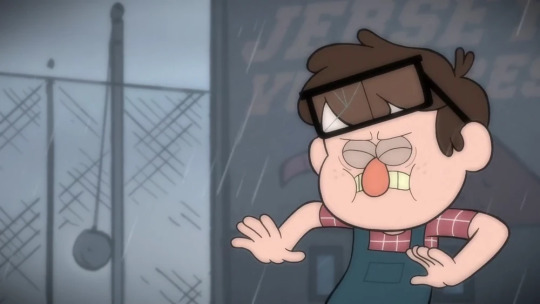
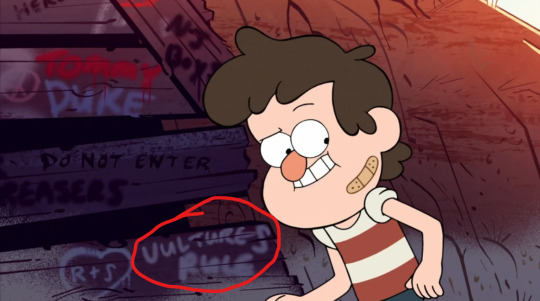
I'll let you take away from all the above what you will. Let's just say: there are a LOT of similarities between Stan and the Axolotl and its real life god counterpart, Xolotl. Does that that mean he's literally the Axolotl when I say he's godly in the Gravity Falls setting? Maybe not.
Here's one last odd something that caught my eye. This is also a leftover from that theory I mentioned above, but I'll just... leave this here, because I don't think anyone else has ever pointed it out before and it expands on what I've been talking about:
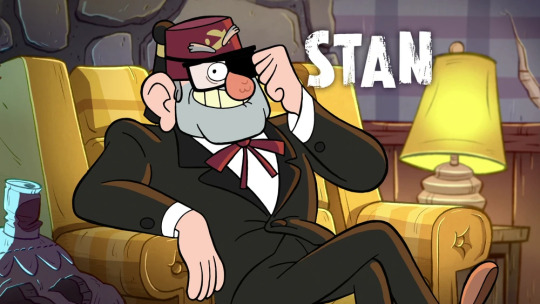
Stan in the opening. The first time we see this guy, technically. He's sitting in his favorite chair. And as we all know, he turns to look at something. But just where the hell does he turn to look?
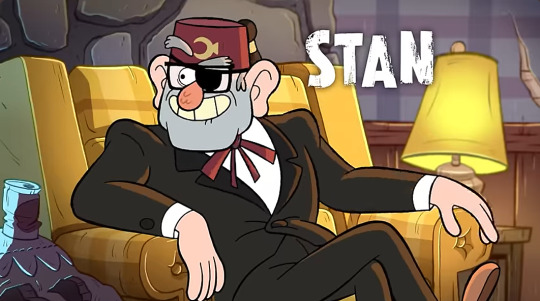
Half of you are like, "Well, what? What's he looking at?". There's a blue glow to his right, and you know what that blue glow is? The tank, which happens to have...
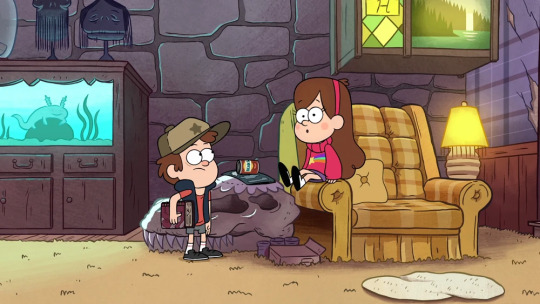
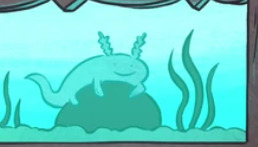
Could be a coincidence, maybe unintentional, but it's... kind of odd, not gonna lie. To have a character that embodies the traits of the setting's god look over at the setting's god the first time viewers see him. Just... a bit strange... and Xolotl was also a shapeshifter god, and given that Stan goes through so many identities in his life... and axolotls are able to regenerate limbs and so are a symbol of healing and rebirth like Stan - whose whole story is about healing and having multiple "rebirths" - is...
Anyways, I've gotten far off track mentioning things from that theory just for fun that I never posted. I may still post it, so I won't spoil all of it or list any more of the very odd coincidences between Stan and the Axolotl, but all you need to know from this post is that Stan shares a lot of similarities with his setting's god in symbolism, and embodies the power of the Axolotl AKA godliness in the Gravity Falls universe: no ego, selflessness, and knowing how to play a long game, because those are exactly the traits he uses to defeat Bill, as well as the traits that help him resolve his character arc wound.
So... now what?
I'm not really sure what to put here, to be honest. This post was a lot more meandering than Ford's was, but that's because there are so many different aspects of Stan's writing that are amazing, especially in symbolism. I hope it was coherent and made sense. A part of me was considering leaving out the ego death and Axolotl parts, but I thought it interesting enough to keep in. Let me know your thoughts!
222 notes
·
View notes
Text
The Choice of Compassion: A Scene Analysis of Aang vs Zuko
should aang have killed ozai?
the age old question. the discourse secondary only to the infamous kat.aang vs zutara ship war. the argument that's been raging for sixteen long, long years and inspired dozens upon dozens of thinkpieces on either side.
so naturally, i'm here to add one more that no one asked for.
now, this debate keeps getting mischaracterized as The Side That Respects Pacifism vs The Side That Wants A Preteen To Commit Brutal Murder when, for the most part, i don't think anyone is really staking their life on the homicide hill. the real issue most people take with aang's arc in the finale isn't him sparing ozai, but rather the deus ex-machina mechanism through which he's able to do so. i agree with that, but i would also take it further to argue that the real problem is that aang's ending is not thematically and narratively consistent with the rest of his arc as set up in the show.
to illustrate this, let's take a look at another scene that plays with similar themes: zuko choosing to save zhao in the siege of the north.
the basics of both scenes are the same: both boys choose, against all logic and common sense, to spare someone who would never show them the same mercy. when it comes down to compassion versus violence, they choose compassion, even at risk to themselves.
but where the siege of the north differs from sozin's comet is that zuko choosing to save zhao is thematically consistent with his arc in season 1, and aligns with where it will go in seasons 2 and 3.
zuko's journey throughout the show is one of rediscovery. he has to find his way back to who he used to be, before his family and his nation warped his perception of right and wrong, and forced him into believing he had to become someone he didn't want to be. it's clear as early as the storm episode that zuko is fundamentally kind, and the person he is now is as a result of being indoctrinated in a culture that perverted violence and cruelty into honour and strength.
in trying to save zhao, the personification of the fire nation's worst qualities and most twisted teachings, zuko turns against the values he's been raised with most of his life and instead chooses to remain true to himself and what he believes is right. it's a triumphant moment because it's zuko returning to the heart of who he is, and who he's truly supposed to be.
and even though his decision may be logically unsound (why risk yourself trying to save someone who tried to kill you?) you don't see anyone complaining that zuko shouldn't have tried at all, because his choice here is a direct - even if brief - resolution to the internal conflict the show has previously established for his character. the narrative consistency of the set-up and payoff allows the audience to recognize the thematic cohesion of this moment in zuko's arc - which is what makes it so powerful and satisfying.
so, the question is: does the same apply to aang's choice not to kill ozai?
the argument supporting aang's decision is usually something as follows: "aang sparing ozai is his way of remaining true to his people and making sure they aren't forgotten. it's a powerful symbol of how he's keeping their culture and beliefs alive even though the fire nation tried to wipe them out."
now that's not a bad argument, in theory. the problem, though, is that if this is the resolution of aang's arc, it has to be a direct response to a conflict established in said arc... and remaining true to air nomad values is not a struggle the show ever set up for aang until the finale.
not once in any of the previous seasons does aang seem to be forgetting his people's ideals, or losing his identity through assimilation, or struggling to reconcile his air nomad beliefs with the ideas he's encountering in this new, changed world. there isn't a long-term, sustained arc about him being worried or concerned about air nomad culture dying out completely, or about taking on the burden of keeping it alive. in fact, the only episode that does reckon with this theme in any capacity - the northern air temple - seems to push the opposite message: that aang should move on and adapt to this changing world instead of remaining mired in the past, and protecting the culture of a people long gone.
(note: i don't like how the NAT episode handled this theme, but for the purposes of this post, we will take it as it was written.)
both zuko and aang are characters whose arcs revolve around change, but if zuko's arc is about moving back to who he truly is, then aang's arc is about moving forward. it's about going from the last airbender to the avatar - about drawing wisdom from different places, about immersing himself in the practices, beliefs and cultures of the other nations, and learning to value them as he values his own.
it's the classic want vs need: what aang wants is to be nothing more than a goofy, peaceful airbender but what he needs is to become a fully-realized avatar, the embodiment of four nations in one. and this conflict is established and re-established repeatedly over three seasons, most especially in his struggle to learn earthbending and firebending, both of which called for him to adopt new perspectives and beliefs contrary to his own.
this is why aang refusing to kill ozai feels so narratively unfulfilling, because it's the complete antithesis of what the show established for aang's narrative over three seasons. the plot point of his absolute pacifism not only comes out of left field (where was this problem when he was going to battle ozai during the eclipse?), it's also incongruous with the depiction of other air nomads in the series (both yangchen and gyatso don't seem to practice absolute pacifism) and with where aang's own arc appeared to be leading.
additionally, it also conflicts with the thematic clash that the aang vs ozai fight is supposed to represent: what was meant to be balance and harmony vs dominance and supremacy now turns into... air nomad beliefs vs fire nation beliefs, which runs contrary to the fundamental message of the entire show. not exactly what you want for the final battle between your protagonist and antagonist!
all of this is not to say that aang should have gone turbo avatar state on ozai and singlehandedly yeeted him into the spirit world. but there were a dozen other ways to handle ozai's end: give him a disney death, let aang learn energybending of his own accord and incapacitate him the way katara took down azula, or - my personal favourite - bring in the spirits in a neat parallel to the book 1 finale, and have ozai's death be a consequence of the imbalance he propagated in the world (i've always felt the avatar being the spirit bridge was a plotline that kinda got shafted in book three, and bringing back someone like koh, for instance, would've slapped).
the point is that for the resolution of aang's arc to be thematically consistent with the established narrative (the validity of this narrative, and whether it should have been different, is another point entirely, but it cannot be denied that this is what the show chose to go with), he needed to place the values and beliefs of the other nations on equal footing with his own, and win because of this willingness to draw from all nations instead of relying solely on his own.
ultimately, remaining true to his compassionate, peaceful nature is not a struggle in aang's narrative the way that it is in zuko's, which is why him choosing to spare ozai doesn't have anywhere near the emotional resonance or satisfaction of zuko reaching out to zhao. meanwhile, the conflict that does characterize aang's arc - being forced to become the avatar - never comes to a meaningful resolution the way that zuko's does. rather, it's thrown out the window in favour of a last minute plot point that robs aang of both agency and development, and destroys the thematic cohesion of his narrative for nothing.
322 notes
·
View notes
Text
tommy's character, bucktommy's inherent flaws, tommy & eddie as mirrors and buddie endgame; a (lengthy) meta analysis
honestly, what's really confirmed my feelings about tommy (and the imminent bucktommy bones -> buddie pipeline) is that there have now been multiple opportunities for the writers to actually make tommy a likeable/serious love interest for buck and they just…haven’t. because while fans are naturally going to overanalyse every little thing, the vast majority of the show's audience are regular viewers who consume the show at face value and don't think twice about it -- so if tommy was intended to be buck's endgame or anything remotely close to it, they'd absolutely want to make the most of his (very limited) screen time to present him in the best light they could. think about karen, the only non-main LI, and how she was introduced to us -- despite hen's cheating, we can see how dedicated karen and hen are to each other and how karen is a complex character in her own right who is immediately easy to root for and love.
comparatively, when we look at tommy's s7 appearances and specifically his interactions with buck, it becomes abundantly clear that there isn't really much depth to their relationship at all. which is fine! it's just... you know. fine. let's get into it.
following the cruise arc, we watch tommy through buck's eyes in 7x04 where he's basically wining and dining eddie -- flying him to vegas, getting them front row tickets to a fight, sparring with him in muay thai, playing pick up basketball with him -- tommy and eddie are so similar (which we'll come back to later), and we even get that line from eddie about how well they "click." as the audience, we are being subconsciously told to align tommy and eddie together -- and furthermore, we are told that tommy can easily make grand gestures when he wants to. now let's compare that to the bucktommy moments of the season.
bucktommy's first date: tommy makes a shady comment that would have outed buck if eddie or marisol caught onto it and then proceeds to abandon him on the sidewalk because he thinks buck isn't "ready" for a relationship with a man
i'll be objective here -- i understand in a show like 911 there's always going to be "unnecessary" relationship conflict for the sake of drama and i can also see how buck trying to play off their date as platonic to eddie might have put a bad taste in tommy's mouth. but we hear from tommy himself that he struggled with being open about his sexuality when he was at the 118 so he could have absolutely extended some sympathy towards buck for not wanting to come out on the spot to his best friend -- especially when tommy fully knows how important of a role eddie plays in buck's life. at the very least, he didn't have to leave buck alone on the curb. this isn't me trying to woobify buck because yeah, he's a grown man, he's fine -- but that doesn't mean it still isn't a bit of an asshole move.
the bachelor party: tommy doesn't dress up for the theme and dismisses buck when he's clearly disappointed about him doing so
tommy showing zero interest for the bachelor party buck planned is practically the writers waving a massive red flag in front of the camera -- him having to leave because he's on call is an understandable 'conflict' plot point but why not have him show up in an 80s themed outfit? it wouldn't have changed anything except that he and buck would have had a positive interaction; buck would have been happy that tommy cared enough to make that small gesture and it could have been a cute way to establish their relationship as one built on mutual effort. (btw, the bucktommy hospital kiss could be seen as a big gesture, sure -- but from a more practical viewpoint knowing how rushed this season had to be, it was also just an easy way for buck to "come out" to the rest of the 118 without having to spend too much episode airtime on it.)
the medal ceremony: tommy says 'enjoy it while it lasts' (which, LOL) and also is not shown reacting to buck receiving his medal. he also has a conversation with henren in a deleted scene.
again, i'm going to try to give tommy the benefit of the doubt -- i'm not saying he has to be sunshine and rainbows all the time and i have no issue with a character having a snarky/sarcastic side. but when his screentime is so minimal, every line of dialogue matters. and it's pretty damning that the writers aren't taking those few chances to give us something to appreciate about him. with buck, tommy makes a dismissive comment for literally zero reason, and with hen and karen, who are rightfully looking out for their friend, tommy refuses to take them seriously at all.
bucktommy's dinner in the finale: buck displays some vulnerability about losing bobby, and tommy... really doesn't seem to care.
honestly i refuse to rewatch this part of the ep because it really icks me out on another level but iirc: buck says he's glad bobby's okay because bobby is like the father he never had -> tommy says "your father's alive" -> something something joke about daddy issues. ignoring #that joke entirely, it's really insane to me that they have tommy even acknowledge the nuclear bomb that is buck's relationship with his parents. yes, we had a bit of a ham-fisted 'redemption arc' in s6 but that doesn't negate the buckley parents being absolutely heinous and the fact that buck verbalises how bobby played the role of the father figure because philip didn't -- all for tommy to basically deny that to his face -- is absurd. tommy has expressed on multiple occasions that he's jealous of the 118 family bond, so this line is just... very interesting to me.
now, let's recap all these events and bring eddie back into the mix!
post-bucktommy's first date, buck is more torn up about the fact that he lied to eddie than the actual date to the point that he has to vent to maddie about it. he then comes out to eddie, who is incredibly supportive (and oliver and ryan make some very curious acting choices indeed). eddie is reiterated as one of buck's most significant relationships.
pre-bachelor party, eddie is the one to suggest he and buck dress in matching (queer-coded) costumes. he then stays by buck's side at the party when everyone else leaves and although we'll never get to see it (tim minear i'm inside your walls👹), they sing an absurdly romantic karaoke song together. eddie is reiterated as one of buck's most significant relationships.
during the medal ceremony, when the camera pans to each member of the 118's love interest/family, it is eddie we are shown smiling at buck, not tommy. this is especially interesting considering we get buck reacting to tommy. i honestly can't get over how a reciprocated tommy reaction would have been an easy yet significant moment to cement bucktommy as a relationship, but they gave us eddie's instead (with chris in the background and marisol conveniently obscured, mind you). eddie is reiterated as one of buck's most significant relationships.
in the final episode, when eddie is experiencing his personal worst nightmare, buck is the one at eddie's side every step of the way. buck talks to christopher, buck reassures eddie (without judgement), and it's made clear that buck will be there for eddie, whatever he needs.
at every possible opportunity, we the audience are being implicitly told that eddie is buck's person. he is his place of support (buck having his more vulnerable coming out scene with eddie rather than his sister); he has buck's back (the bachelor party); he is his family (medal ceremony reaction), and ultimately, this goes both ways (finale).
some other things worth noting: when buck has his coming out scene with maddie, she tells him he's confused about his feelings in a way that seems to indicate she's talking about his feelings towards eddie ("if you there's something you need to tell eddie, you will"). in bobby's conversation with buck in the firehouse, he's verbally supportive of tommy and even asks if buck is going to see him, but buck goes to eddie's house instead. these were deliberate choices made by the writers; eddie has been consistently intertwined in bucktommy's relationship both overtly and subtextually throughout the entirety of s7. and let's not even get into the whole 'evan' thing, because that could be a whole other post in itself.
from the first moment we start to learn about tommy's character (beyond his... coloured past), we find out that he and eddie are practically mirrors. why not make tommy and buck share similar interests? why not give them something to bond over? why present tommy and eddie as almost identical in every way? because tommy is a placeholder for eddie. buck's initial bisexuality journey can't happen with eddie when eddie still hasn't come to terms with his own feelings. so, in the meantime, tommy is the "safe" choice in buck's mind because buck has nothing to lose with tommy whereas he's got everything to lose with eddie. buck can't confront what he truly wants yet because the risk factor is far greater and it's been repeatedly asserted that buck has an issue with people in his life leaving -- he would never do anything to jeopardise his relationship with eddie.
but ultimately (and in my opinion, fairly soon), we are going to get that moment where it "clicks" for buck and he realises that it is eddie he has feelings for. and when that happens, there's basically only one way it can go. we know buck can't keep secrets from eddie; we know eddie is going into s8 feeling "isolated"; we know tim loves making his characters suffer before they can be happy. in my mind, the narrative is going to go something like this: buck feelings realisation -> pining buck era -> eddie healing journey and a reevaluation of what buck means to him -> some insane life-threatening situation that really doubles down on how buck and eddie care more about each other than anyone else because it is 9-1-1 at the end of the day -> love confession induced by their dramatic near-death experience -> #BUDDIE_CANON !
when we factor in how there was a possibility of eddie having the sexuality arc this season instead, how tim has said buddie is one of his favourite dynamics of the show, and how supportive both oliver and ryan are of the ship, i really can't see how everything isn't building to buddie endgame. every other main pairing of the show has had seasons of development, of conflict, of bonding moments. buck and eddie have gone through that with each other time and time over (tsunami/lawsuit/shooting arc etc), which is why every other random love interest that's introduced for either of them falls flat in comparison. they quite literally are exactly what the other person needs; buck wants the stability of a home, a family, and unconditional love; eddie wants someone he can trust, a caretaker for his son but also a partner. buddie is the ship the audience wants to root for, because we know they work! now that we have canonically bisexual buck and eddie finally having to face his complicated feelings about losing shannon, buddie isn't just the logical conclusion -- it's the inevitable one.
#if you made it all the way to the end of this mammoth post... thank you!#very curious to know what u guys think and if u agree/disagree#buddie meta#buddie analysis#buddie#buck x eddie#buddie theory#911 meta#anti bucktommy#<- not like... dramatically. but my stance is pretty clear!#eddie diaz#evan buckley#911 on abc
205 notes
·
View notes
Text
Turning Off Your Brain and the Critical Lens
Alright, let's start with this: there is a thing called a critical lens. It is a way of looking at a piece of art, examining what it's saying to us about itself or its subject or themes or whatever.
There are many critical lenses. Because this is something that's mostly only taught at the college level, most of them are (in my opinion) mired in academic language and not actually all that interesting in and of themselves: I think if you read a dozen stories through a feminist lens, you really start to think "okay, yeah, I get it". Different readings of different texts through different lenses can be great fun though, and it's one of my favorite parts of media criticism, and something that I wish people were more explicit about.
I'm going to talk about the Barbie movie, because it's easy. The feminist lens is obvious and in my opinion intended: it's the thing that the movie is most trying to be about, and as a consequence, it's something that probably has the most critical meat. But you can also read the movie through other lenses, and ask what it has to say about capitalism, about race, about neurodivergence and queer theory and game theory and a bunch of other things.
Some of these readings are Unintended. The author (in this case, hundreds of people working together on the film) did not intend for you to look at the movie to see what it's saying about, say, American Imperialism. Probably.
I personally enjoy unintended readings. I like teasing apart a book to see what it's saying about different things, and how it's saying it, and what the assumptions it's operating under, and whether this creates anything interesting when I bring a different set of assumptions. I think the writers and actors of Winter Soldier were not trying to say anything in particular about masculinity, but fuck it, let's watch the movie and think about it.
Sometimes people will watch something and recommend that you turn your brain off. Sometimes they'll say this to you just as you're about to start in on some critical analysis of something that definitely was not made with that critical analysis in mind.
Here's how I think of "turning off your brain": it's a critical lens. It's not a critical lens in the sense that academics might use it, but you're looking at this piece of media from a specific viewpoint, and that viewpoint is "omg they're in love" or "fuck yeah" or "no, don't go into the basement!". There are certain pop genres that greatly benefit from being viewed this way, at least in terms of pure enjoyment.
When I sit down to watch a romcom, I can do it with male/female social dynamics in mind, or I can do it with "aw, I hope these kids get together" in mind. One is the intended reading, and I don't think that it should get all that much privilege for it, but I do think generally it can result in better enjoyment. I love media criticism and consider it to be one of my main hobbies, but if you fall in love with one particular way of viewing media and only use that single one, you're going to have a bad time.
I write and generally enjoy rational fiction, which comes with its own lens, which I guess we can call the rational lens. If you sit and view a work through the rational lens, sometimes you can have fun with it: you try to work through the systems as presented and the actions of the characters and think about how you could make everything make sense. The way to do this that's not very fun is to look at a work through the rational lens and conclude that the author is dumb, the characters are dumb, and the worldbuilding is shit. I guess this can be fun if you have a sense of smug superiority, but I personally do not.
One of the things that I love about media criticism is that you can sometimes extract weird and new things out of a work. One of the things that I love about fanfic is that you can take a deliberately strange reading of a work and then write as though that reading was true. You can look at Batman and say "what does this say about income inequality" and then start writing and say "this is about income inequality now". You can look at Winter Solider and find a reading where Cap and Bucky are gay and then write it out.
Where I think people fail in a way that's personally annoying to me is that they take their preferred reading and then loudly claim ("ironically" or not) that this is the One True Reading against which no other readings can stand. Sometimes "that is not The Point of [thing]". I think you get that a lot from the "shut off your brain" crowd, but I've seen it from other places too, and I would attribute it to people talking past each other, sometimes not even realizing what critical lens they're using.
If you're talking to me, you can just say "non-preferred lens" and I'll understand, or maybe I'll say "wat" because I might forget this blog post moments after I write it.
294 notes
·
View notes
Note
If we're asking about games on your list of favourites, as someone who adored Paradise Killer, I'd love to hear your thoughts on it! I always enjoy your analysis.
so first of all the aesthetics of paradise killer are really good. usually games that were written in english but read like translations from japanese irritated me, but here i think it is very much leaned into and embraced as an aesthetic and set of cultural signifiers in its own right, which i really enjoy. the character designs are outlandish and charming. but what i really like about it is like, the way the core premise works
in most detective games, there is a correct answer, and not getting it is a failure state. you can't end a case in ace attorney with your innocent client being convicted, you can't get the wrong guy in the frogware sherlock holmes games. and this invariably, even if the game is critical in other aspects, tends to come around to a fundamental faith in the legal system and authority, right--something that's kind of baked into the detective genre at a fundamental level.
paradise killer upends that by simply saying "you are the detective. get the facts you need, make a compelling argument, and if the authorities above you believe you then you get to distribute justice as you see fit." you arrive on the island you're investigating and you're immediately told "hey, this member of a disenfranchised underclass did it, we've already arrested him, here's the evidence." and absolutely nothing stops you from taking that evidence and walking into the trial room and presenting it and saying "yep, he did it!" and beating the game! it's not a 'bad ending', you don't get a big popup saying 'you're wrong', the powers that be just accept the convenient narrative you've been given to present and everything moves on.
i like this from both, like, an ideological perspective, and also from an interpersonal stakes perspective. in most detective games, you can't miss a crucial piece of evidence, either because the game will not proceed until you pick it up or because you'll be forced to restart the 'trial' or 'deduction' segment when you game over because you're missing it. in paradise killer, whatever argument you put forward, if enough evidence supports it--even if you know for a fact it's wrong!--leads to the person you're accusing being executed. so the stakes are much higher, right, because instead of a game over screen and trying again, getting it wrong means that's just... how the game ends, with an innocent person being executed.
and more importantly i think it does a fantastic job--better imo even than something like disco elysium--at deconstructing the fantasy of justice. a constant theme of the game and something that the protagonist repeats often is "there is a difference between facts and the truth". you can withhold evidence at trial because it implicates your friends, or misrepresent it to implicate that bitch you hate. nothing in the system exists to stop you getting wrong, in fact your superiors encourage you to make the easy completely stritched up conviction and move on with your life.
and at the end, even if you get it right, if you catch all the criminals--all the time you spend investigating this island shows that, like, the society you're part of is fucking evil! you're all deranged immortals making constant human sacrifices to your evil gods! and you don't change that by solving the case, the whole thing just packs up and moves on. you don't get any comfortable resolution to that or to your role in it. you can play lady love dies as a diehard true believer or as a dissident rebel but either way she's ultimately just another cog in a machine, dispensing an alien and uncaring justice that is only attached to any real morality or truth by your decision to do so. a genuinely incredible game.
plus i like how whenever you open it a voice says 'paradise killer' so you know you're playing paradise killer
242 notes
·
View notes
Text
I've been reading Dungeon Meshi and the cover for chapter 52 really stood out to me:
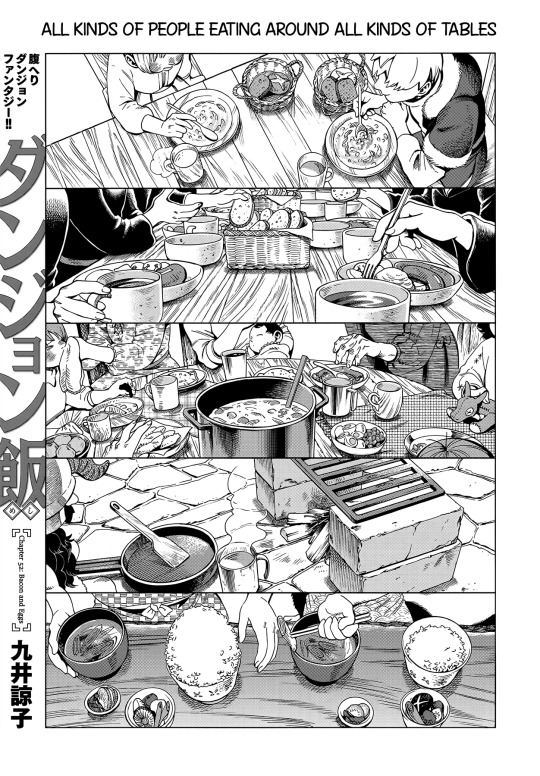
I think this cover so perfectly demonstrates the core themes that have been set up throughout the series thus far and also represents the characters really interestingly. Specifically the differences in their upbringings through the act of eating.
(Analysis under the cut ^_^)
First off, Laios and Falin are eating alone because they left home early in life and only have had eachother. They've had other party members but they've never enjoyed the toudens company like the two think they do, especially Laios. The two are alone because often times their party members don't actually care for them or see them as friends.
Marcille is eating in a cafeteria at her magic school, the composition is symmetrical to show the rigid lifestyle of the school and show how routine it is. It was a core time in marcilles life because she was happy and because it was structured. Often times, structure is the most comfortable thing someone can have, even if it is ultimately fleeting. School will end eventually and most of the connections you make are temporary but still effect us.
Chilchuck is eating with his family, showing the importance of his family to him. I really like this one in particular because even if his family is important to him, he'll always keep them at an arms length. His face is the only one shown, showing this about him. His face is also being cleaned by another person, showing the need for vulnerability and letting your gaurd down around people you care for, but also how Chilchuck is unwilling to do that.
Senshi is eating alone, he doesn't have a table either, showing how he lived in the dungeon for a long time and how he didn't have anyone to feed or care for even if it was something he deeply longed for. He's alone because he doesn't have anyone that could be there for him anymore, no family, no friends. I'm crying actually.
Finally, with Izutsumi she's eating with another person. Her table maners are poor, she can't hold chop sticks correctly and she's giving away the food she doesn't enjoy. We've seen this about her countless times but it's really amplified by this because it shows that she's always been like this, it's ingrained in her behaviour because no one either cared enough to try to teach her to be polite or never properly made an effort to. I'm sure Maizuru would try to fix her maners, but wouldn't do it in a thoughtful caring way that'd be actually helpful for izutsumi. She'd probably try to "whip her into shape" rather than treat her with compassion and patience.
All of these really accurately show how important connections are, how you need people. You need someone that will never treat you poorly, someone that will stick with you through thick and thin because they genuinely love you. You need the simplicity of routine, you need people that gravitate in and out of your life, those connections are important and often temporary but mean the most in the time you knew them. You need family, people you can let your gaurd down around and be truly happy with, even if it's hard to. You need people to care for, people you can feed and love in the simplest terms of helping them. And finally, you need people who teach you, people who will be there for you with kindness and treat you with compassion even when you are doing what they deem as bad.
I'm still not finished with this series but I genuinely love it so much so far. I'm barely halfway through and it's developed emotionally impactful and deeply honest themes and ideas that really strike a cord with me. It's so interesting and I can't wait to finish the series and better understand these characters ^_^
Thank you for reading all the way through!! Feel free to add your own bits of analysis or additional food for thought :33 (no spoilers tho please since I've still not finished the series)
#dunmeshi#dungeon meshi#delicious in dungeon#falin touden#falin dungeon meshi#laios touden#laios dungeon meshi#marcille donato#marcille dungeon meshi#senshi of izganda#senshi dungeon meshi#chilchuk tims#chilchuck dungeon meshi#izutsumi dungeon meshi#izutsumi#long post#text post#analysis#dungeon meshi analysis
262 notes
·
View notes